Fab Fabul
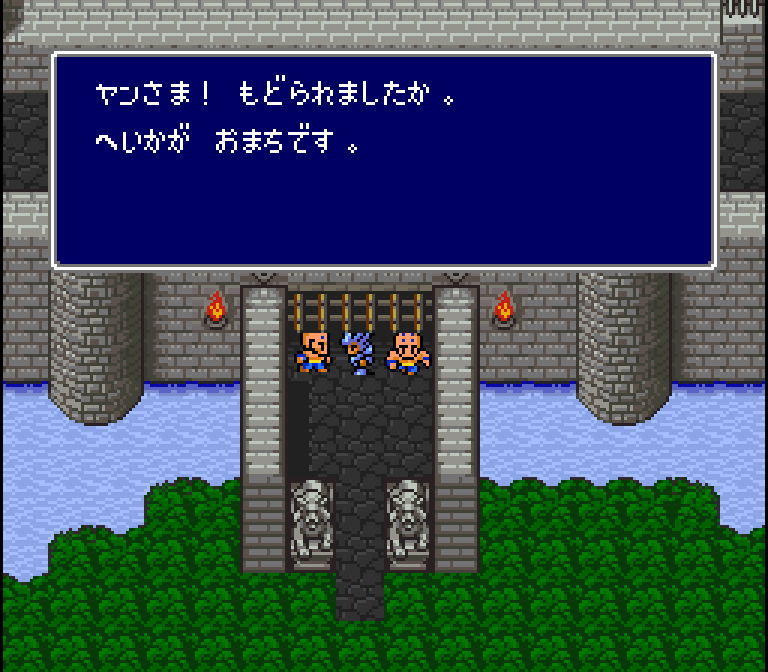 | 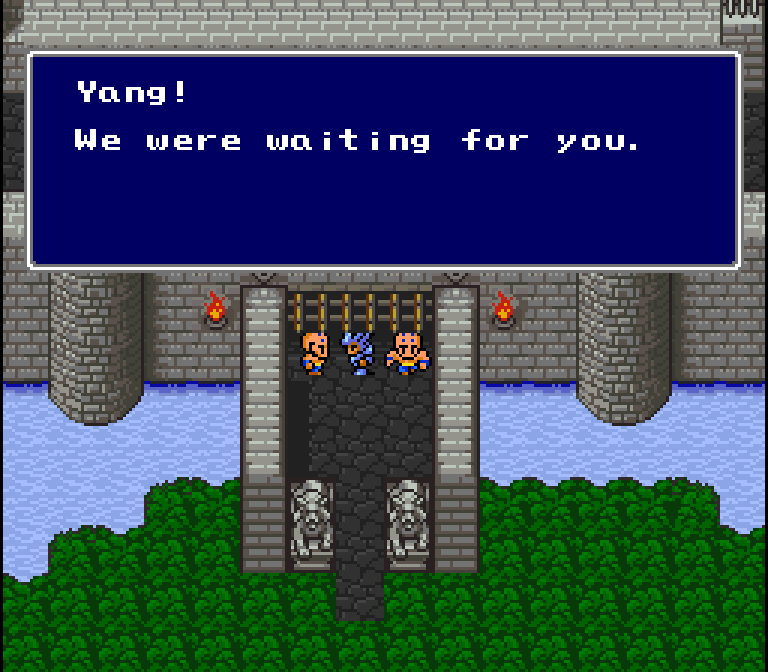 |
| Final Fantasy IV (Super Famicom) | Final Fantasy II (Super NES) |
When you enter Fabul, there are a few sentries near the front gate.
In English, they all say, “Yang! We were waiting for you.”
In Japanese, they actually say something like, “Master Yang! You’ve returned. His Majesty is waiting for you.”
We’ll actually see that most of the text in Fabul is changed in weird ways like this and is often extremely abbreviated.
Incidentally, as a kid I always thought the Fabul soldiers had weird helmets on.
In actuality, though, they’re modeled after Shaolin monks with the distinctive incense burn marks on their heads:
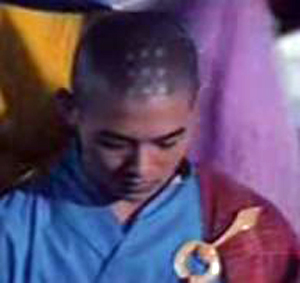
You often see these dots used in other Japanese stuff that involves any sort of martial art, not necessarily Shaolin kung fu. That’s why Krillin/Kuririn from Dragon Ball has them, for example:
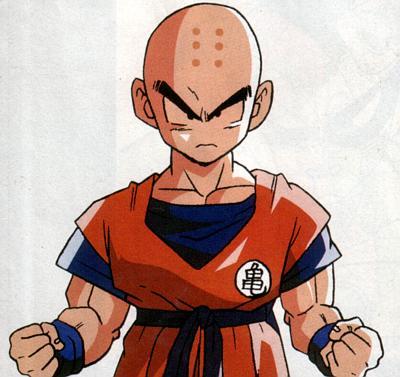
Still, to this day it’s hard for me to unsee these Fabul guys as wearing some kind of unique outfits with strange headgear attached.
Also, just as a quick aside, “Fabul” is meant to be pronounced something like “Fahbul” and not “Faybul”.
Treasure Swapping
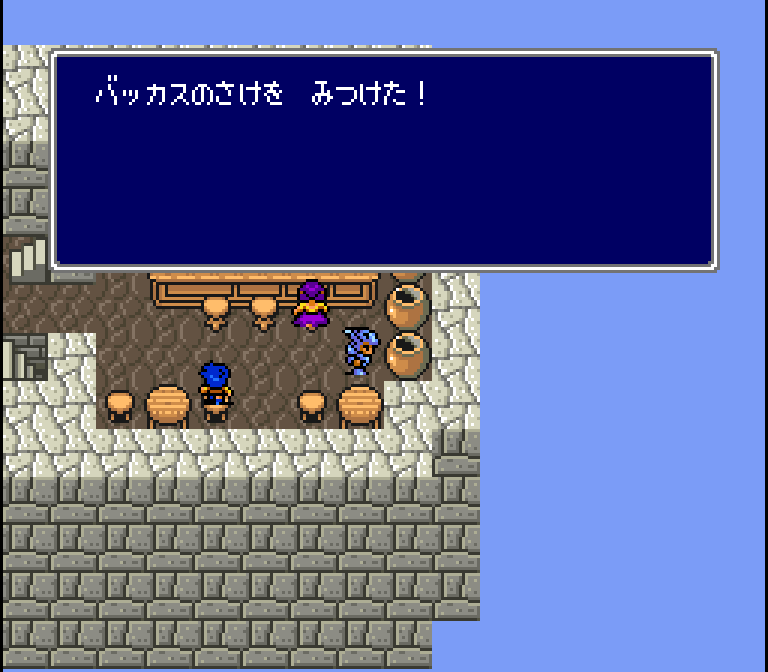 | 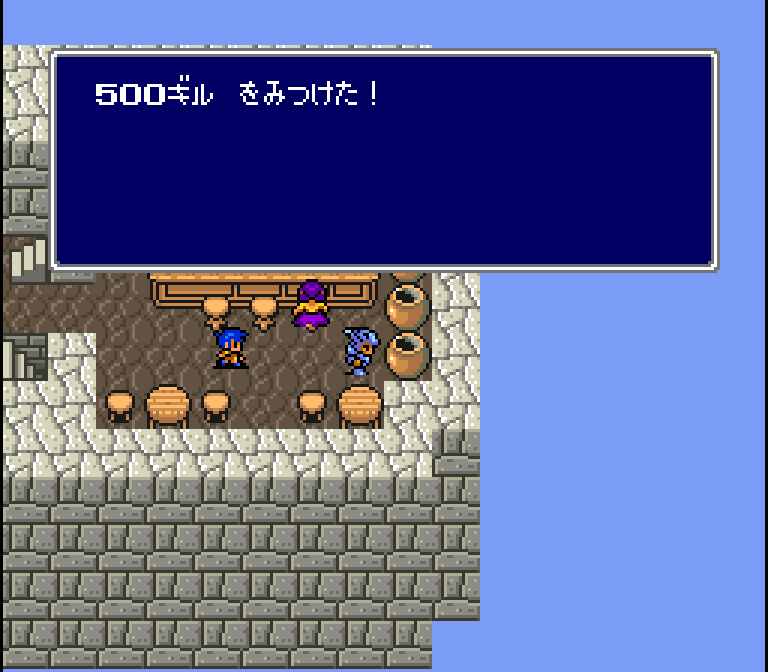 | 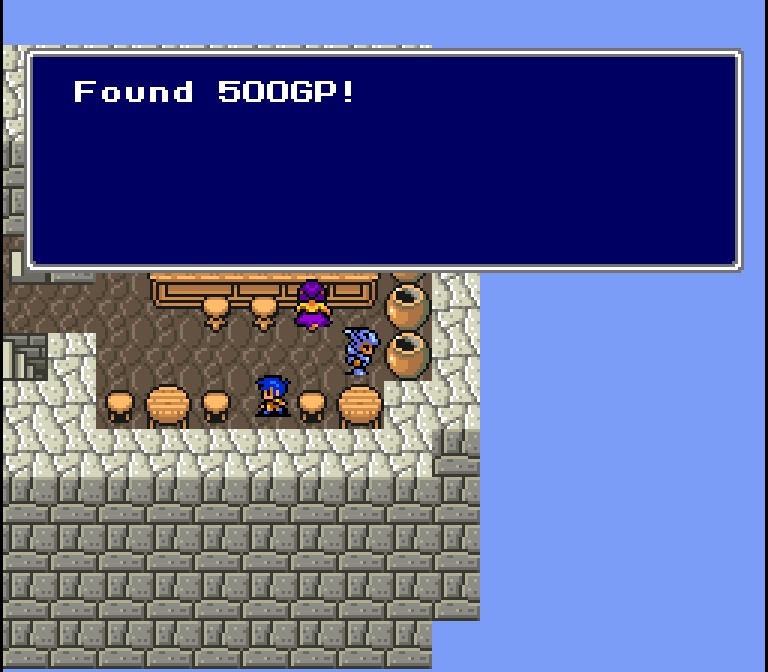 |
| Final Fantasy IV (Super Famicom) | Final Fantasy IV Easy Type (Super Famicom) | Final Fantasy II (Super NES) |
Surprisingly, nearly all of the treasures found in Fabul have been changed from the original version.
Here’s a look at them:
| Location: | Final Fantasy IV | Final Fantasy IV Easy Type | Final Fantasy II |
| Left Tower | Zeus’ Anger | Potion | Cure1 |
| Left Tower | Bomb Fragment | Potion | Cure1 |
| Left Tower | Antarctic Wind | Heal-All Medicine | Heal |
| Left Tower | Potion | Tent | Tent |
| Right Tower Pub | Bacchus’ Wine | 500 Gil | 500 GP |
| Throne Room | Hermes Shoes | Potion | Cure1 |
| Throne Room | Spider Web | Potion | Cure1 |
I like how the Bacchus’ Wine item is hidden in the pub – it actually makes sense! I never made that connection in Final Fantasy II because the item was dummied out and it was changed here to give you money instead.
Evil Weapons
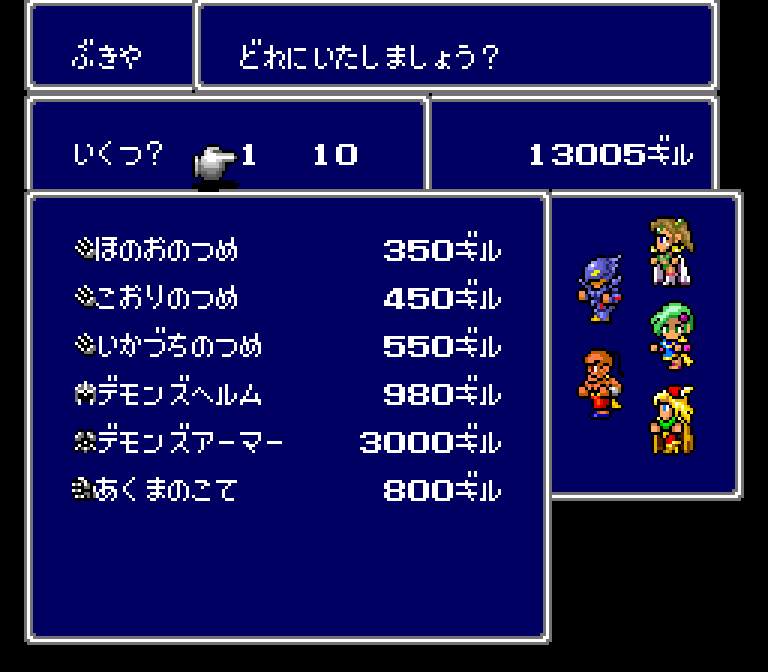 | 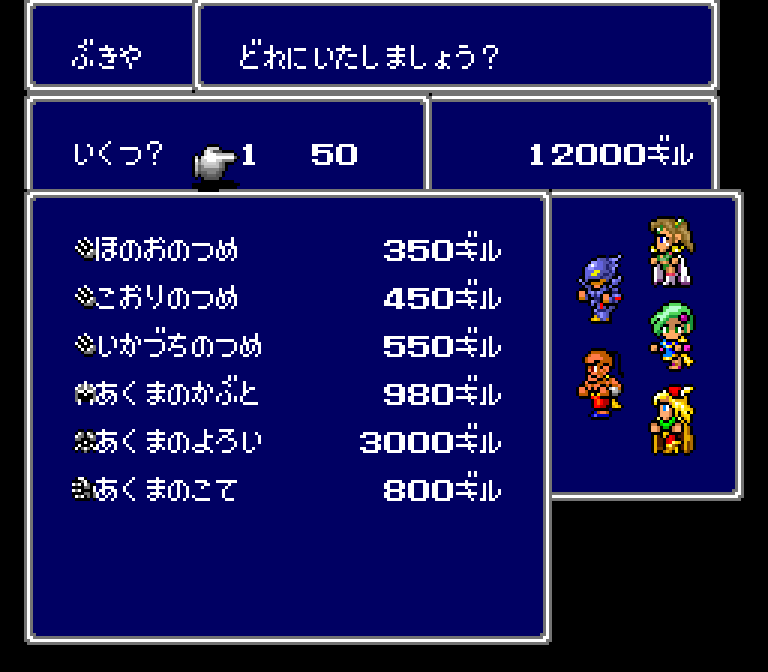 | 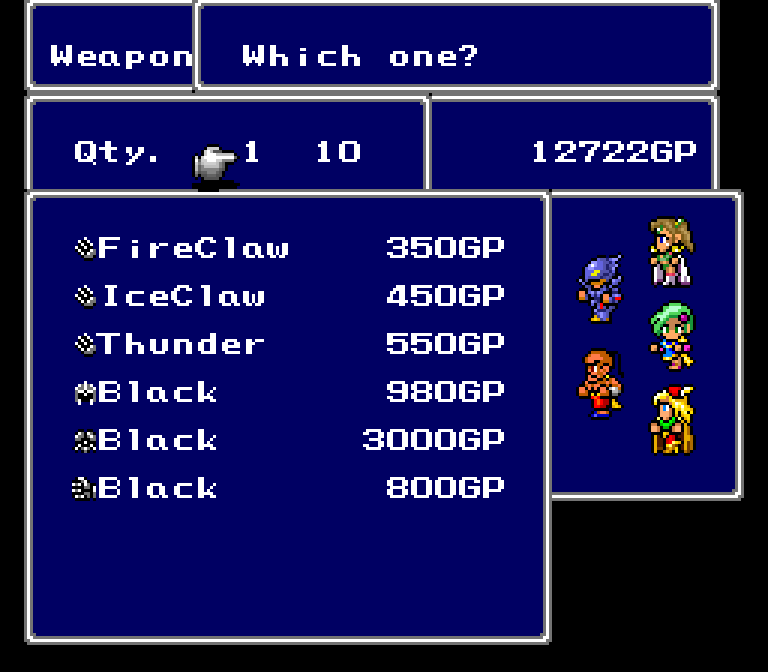 |
| Final Fantasy IV (Super Famicom) | Final Fantasy IV Easy Type (Super Famicom) | Final Fantasy II (Super NES) |
While we’re on the subject of items, it’s interesting to see how Cecil’s equipment names have been changing.
In Final Fantasy IV, a lot of Cecil’s weapons and pieces of armor have words like “Hades”, “Demon”, and “Devil” in their names.
Since that’s obviously a no-go for Nintendo back then, these all got changed to simply be things like “Shadow” and “Black”.
Also, for Final Fantasy IV Easy Type many of these equipment pieces were renamed to be somewhat simpler. For instance, the “Demon Armor” in Final Fantasy IV actually uses the English words for “demon” and “armor”. For Easy Type, the name was changed to use the actual Japanese terms for “demon” and “armor”.
So even in a comparison list of item name translations, these change wouldn’t be obvious unless someone specifically explained them to non-Japanese speakers… exactly like I’m doing now.
The Final Fantasy II instruction manual accidentally keeps in some of the stuff that was censored out in the game itself. For instance, we see that it still has “Hades” equipment in the manual:
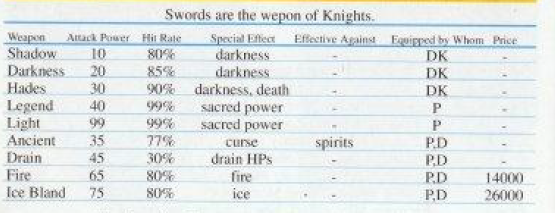
’Sup
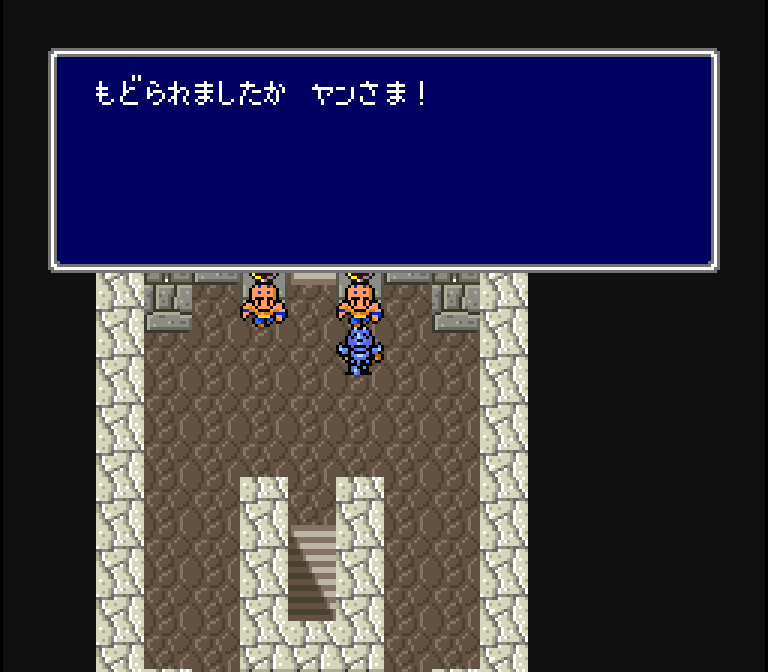 | 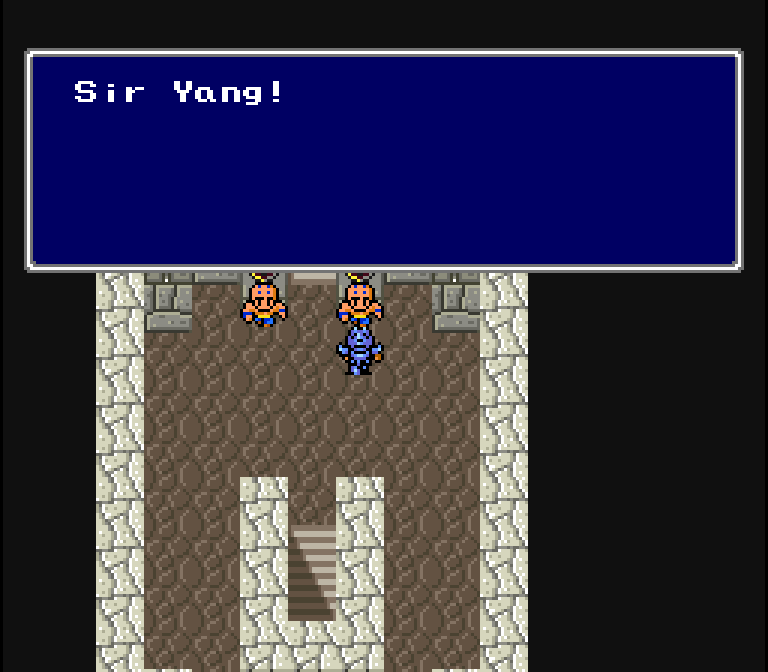 |
| Final Fantasy IV (Super Famicom) | Final Fantasy II (Super NES) |
These monks in front of the king’s throne room greet Yang when you talk to them.
In English, they say, “Sir Yang!”
In Japanese, they say something like, “Master Yang! You’re back!”
The Better Half
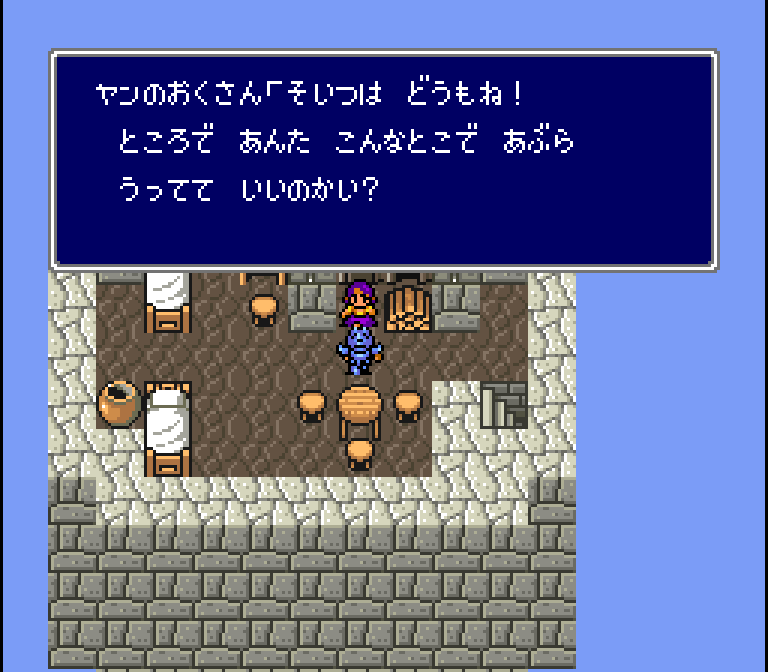 | 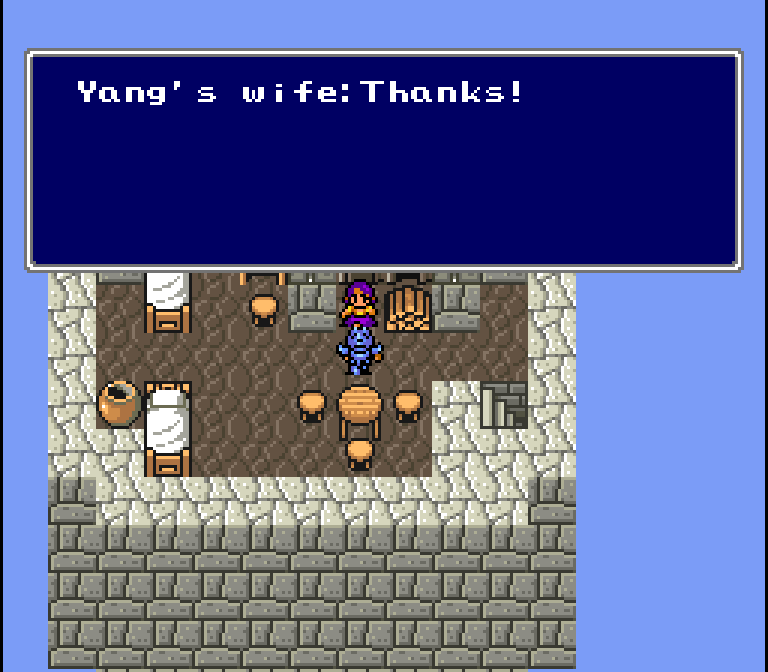 |
| Final Fantasy IV (Super Famicom) | Final Fantasy II (Super NES) |
Yang’s wife is one of my favorite characters in the game – in both languages she has a bit more spirit to her than the average NPC. Her English text is often abbreviated, though.
When you first talk to her, here’s what she says:
| Japanese Version (basic translation) | English Translation |
| Woman: Oh, welcome home! | Woman: Hi! Honey! |
| Yang: This is my wife. This is Sir Cecil. He saved me from a dangerous situation. | Yang: It’s my wife. This is Cecil. He saved my life. |
| Yang’s wife: Thanks for that! | Yang’s wife: Thanks! |
| By the way, honey, is it really okay for you to be loafing around here? |
Already we can start to see just how extensive the text cutting is in Fabul.
We also see how Yang just calls him “Cecil” in English but “Sir Cecil” in Japanese. I do like the translation “He saved my life.” though, very succinct and gets the point across better.
Yang’s American Wife
In Japanese Yang’s wife speaks with a little more personality than the average NPC in the game, but it’s mostly just a mix of casual speech with a headstrong, housewife-like speech style. It wouldn’t be too hard to convey it well in normal English, but the PlayStation localizers decided to give her an American Southern-like accent. Here are some examples:
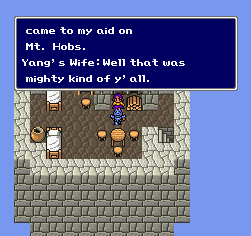 | 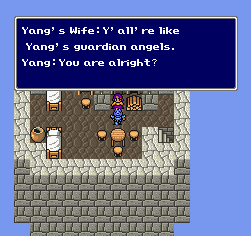 | 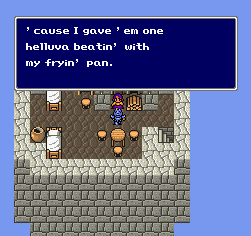 |
| Final Fantasy IV (PlayStation) | ||
To be honest, I think this was a poor localization choice. Amid all the serious stuff going on in Fabul, with martial artists dying, the castle being raided, the crystal getting stolen, and Rosa getting kidnapped, having this goofy, out-of-place accent is pretty jarring. It doesn’t really fit her character, and it’s really strange that in this decidedly Orient-themed kingdom there’s some country gal with a rural American accent. And the disciplined kung fu master who leads the monks is somehow married to her?
I dunno, I really do think that her speech style could’ve been handled just fine without needing to resort to special accents or dialects.
I’d normally chalk it up to the PlayStation localizers being wacky and such, but this “country gal wife” thing still lives on in later translations. We’ve already seen how some PlayStation localization choices have filtered down into later releases, and this is one of the big ones. For example, the GBA translation sticks with this accent, but it tries to turn it down a little bit:
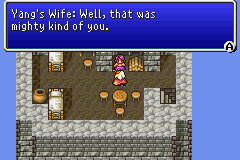 | 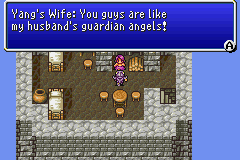 | 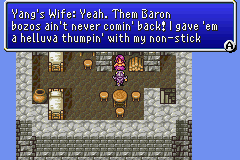 |
| Final Fantasy IV (Game Boy Advance) | ||
And with the PSP translation based off of the GBA translation, some vestiges of her rural localization still remain:
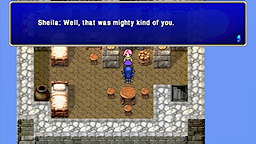 |  |  |
| Final Fantasy IV (PSP) | ||
Keep in mind that the PlayStation translation was released in like 2001 or so, and the PSP version was released in 2011. So this simple localization choice has survived through three releases and at least a decade, if not more.
It’s also interesting to consider that the word “helluva”, which definitely wouldn’t have been allowed in the original translation due to Nintendo of America’s policies at the time, was used in three subsequent releases, including one of Nintendo’s own handheld systems. And, even though someone on the PlayStation localization team censored every instance of swearing in the script yet left this “helluva” alone, it would seem that “helluva” isn’t considered a bad word by the many teams and companies involved. I never really considered it a particularly bad word myself, maybe on the same level as “crap”, but it’s really interesting to see what committees and corporations think about the subject.
Anyway, the DS version was translated mostly from scratch, I believe, so it avoided being the PlayStation translation’s descendant:
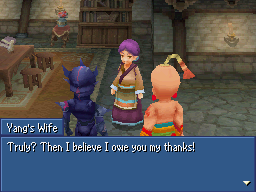 |  | 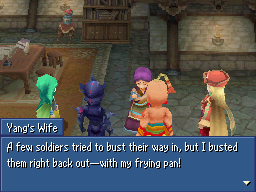 |
| Final Fantasy IV (DS) | ||
It looks like the DS translation handles her text without any particular dialect or accent at all. It keeps the same tone as a lot of the other character text, so she sounds much more polite and less laid-back than her original character, but her DS version is definitely the best of the bunch.
So there you go – that’s a quick look at how the PlayStation translation, as wacky as it was sometimes, still continues to live on in the latest translations of the game!
Meditate on This
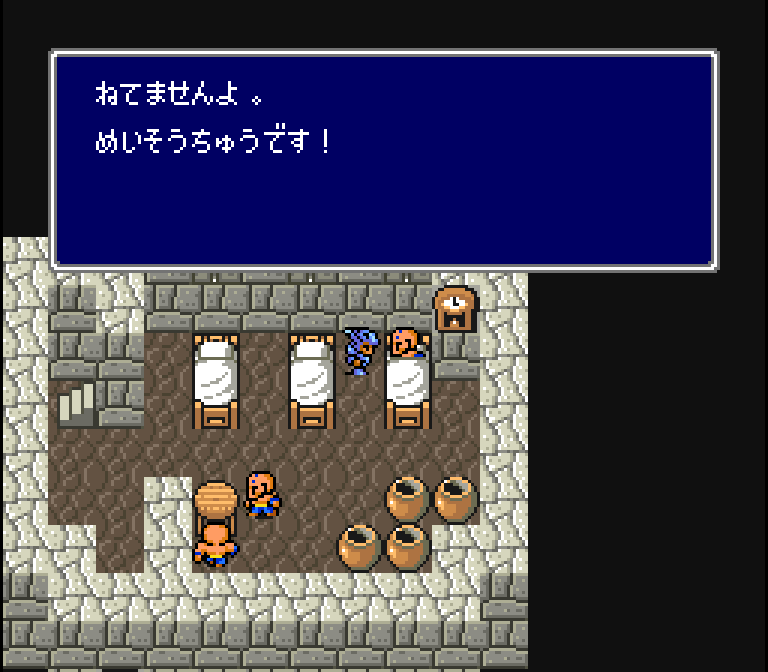 | 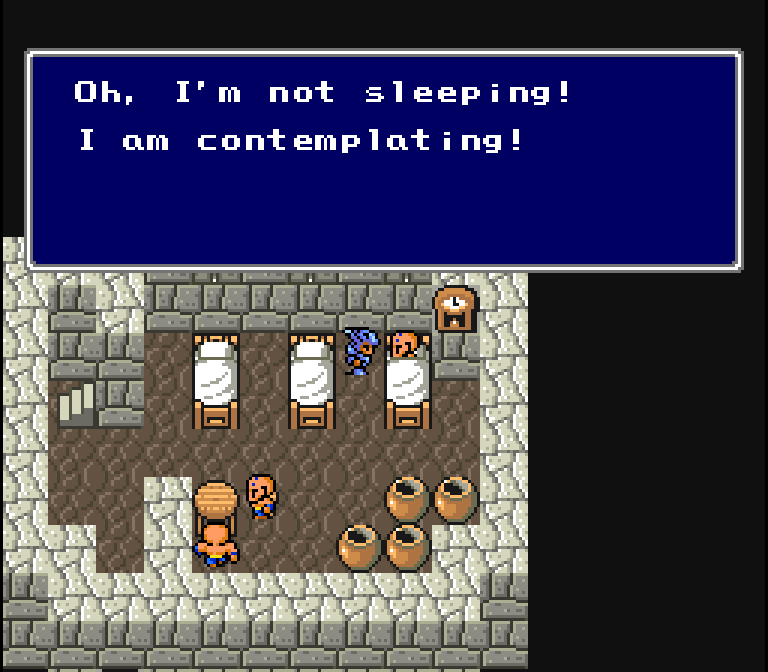 |
| Final Fantasy IV (Super Famicom) | Final Fantasy II (Super NES) |
There’s a monk who appears to be sleeping in a bed in the right tower.
In English, he says, “Oh, I’m not sleeping! I am contemplating!”
This always sounded weird to me when I was a kid. I figured he was saying that he’s meditating.
Upon checking the Japanese text, yep, that’s exactly what he’s saying. “Meditating” would’ve been the more natural way to translate this, so this reinforces the idea that a non-native translator worked on much of this game’s translation.
Just Beat It
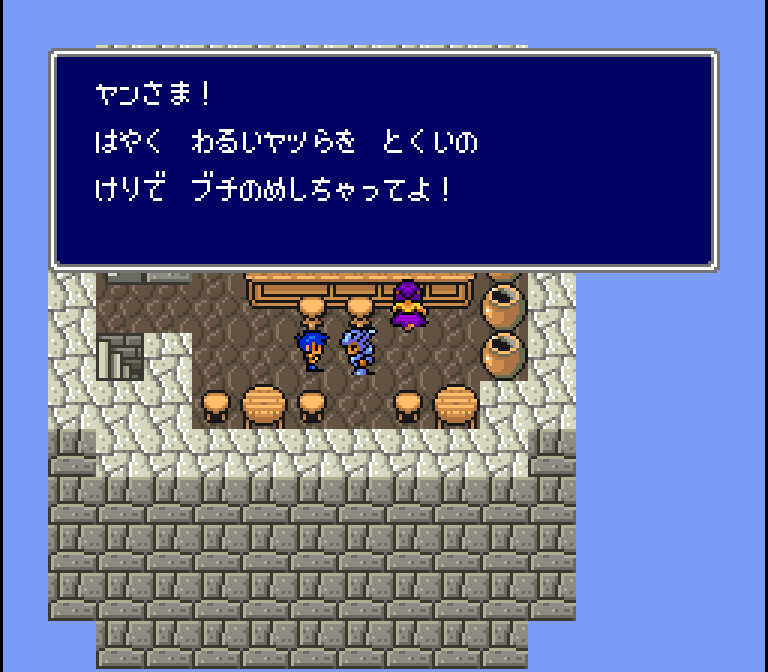 |  |
| Final Fantasy IV (Super Famicom) | Final Fantasy II (Super NES) |
There’s a hyper kid in the Fabul pub.
In English he says, “Beat them up, sir!”
It seems like a weird thing to say, especially with nothing else around it.
In Japanese he says something like, “Master Yang! Hurry and kick the bad guys’ butts with your special kick!”
Safety Zone
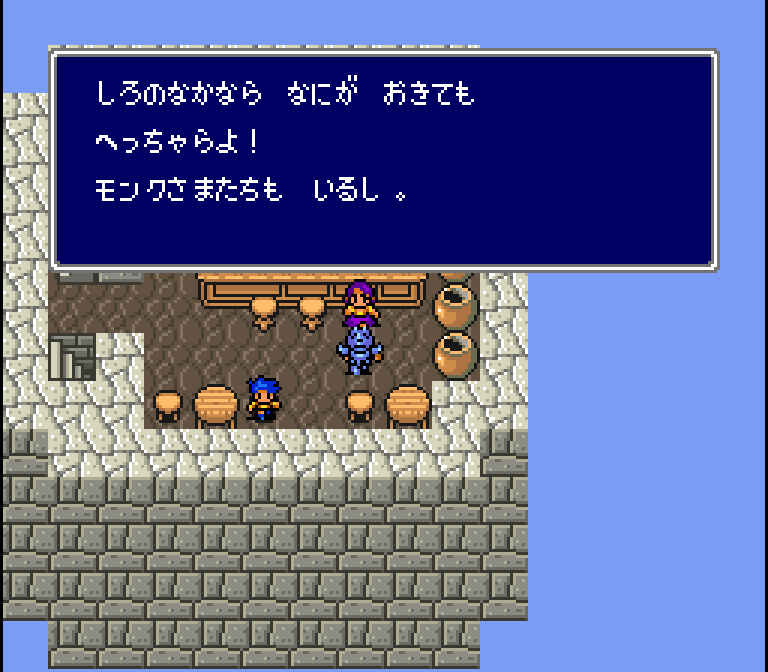 | 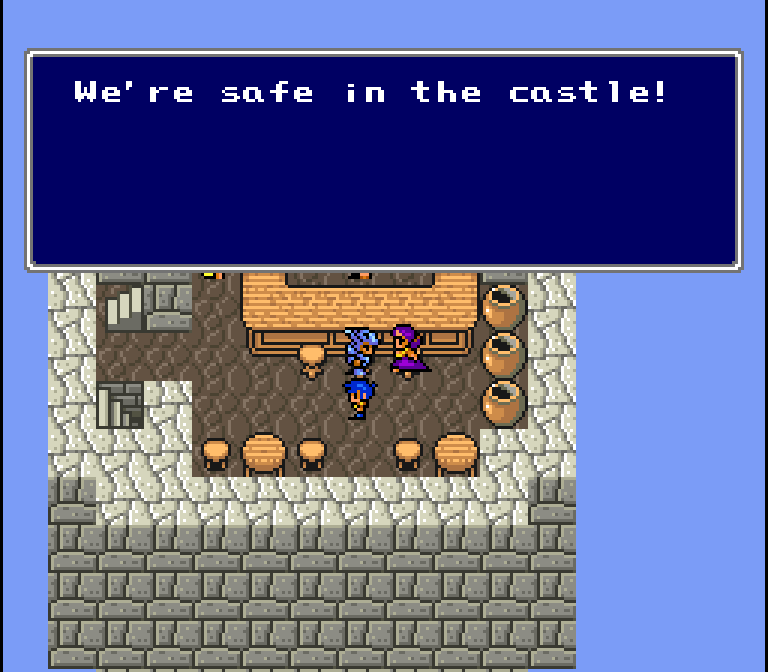 |
| Final Fantasy IV (Super Famicom) | Final Fantasy II (Super NES) |
There’s also a lady in the pub. In English she says, “We’re safe in the castle!”
That makes sense and all, but in Japanese she says more: “(As long as we’re) inside the castle, anything can happen and it won’t matter! Plus we have the monks.”
Monky Horror Picture Show
 | 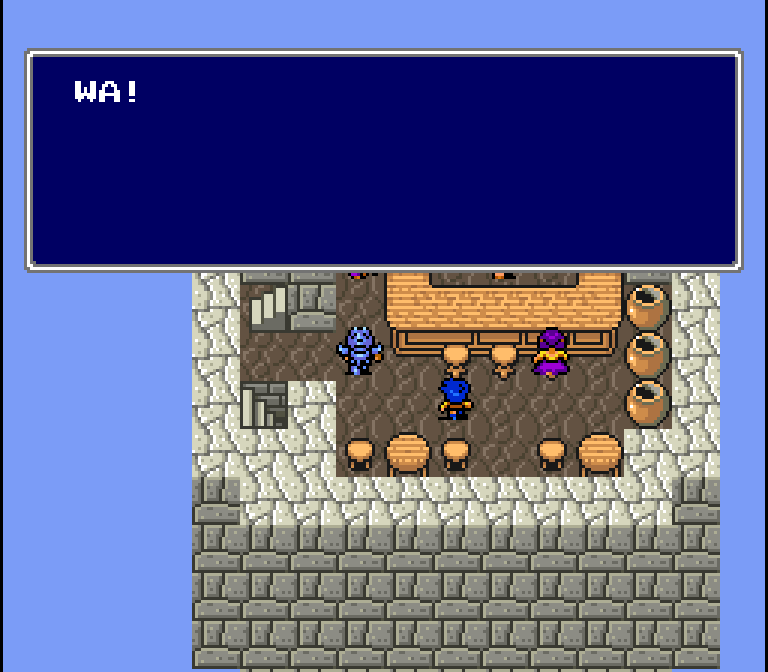 |
| Final Fantasy IV (Super Famicom) | Final Fantasy II (Super NES) |
If you talk to this dancer girl in the corner of the pub, she’ll offer to dance for you.
If you say yes, it turns out the dancer is actually a dude! Here’s how the scene then plays out:
| Japanese Version (basic translation) | English Translation |
| Cecil: Ack! | WA! |
| (The monk starts jumping around) | (The monk starts jumping around) |
| Hahh! | ACHOOO! |
| Hahh! | ACHOOO! |
| Hahh! | ACHOOO! |
So Cecil’s reaction has been cut out – or at least it’s not made clear anymore. Until now, I always assumed the “WA!” was just the monk doing his weird dance routine. Nope, it was supposed to be Cecil freaking out.
Then we see the infamous “Achooo” thing again. If you missed it, we took a look at this issue back on Mt. Hobs.
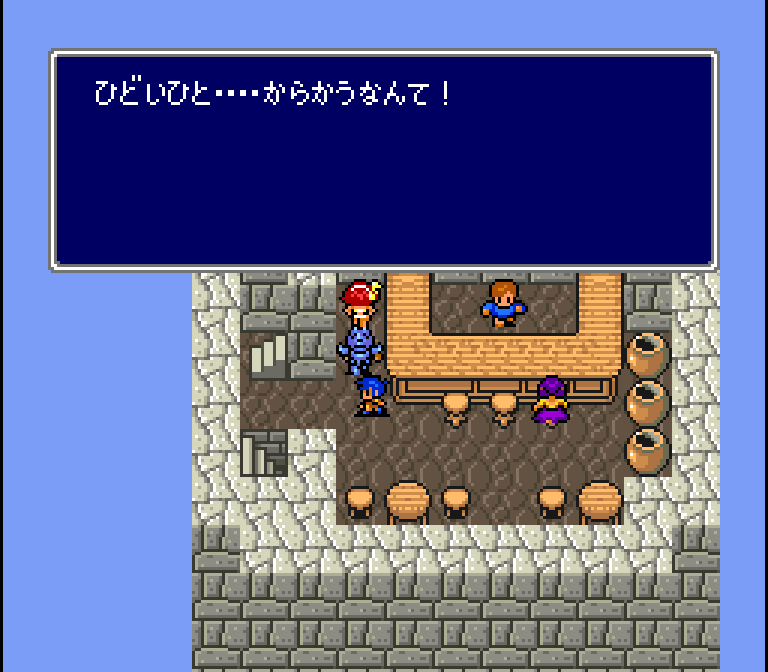 |  |
| Final Fantasy IV (Super Famicom) | Final Fantasy II (Super NES) |
By the way, if you decline the dancer’s offer, they say in English, “Did you make fun of me?”
This always seemed strange to me as a kid. It turns out that the Japanese text actually says something like, “Poking fun at me… You’re so mean!”
In Japanese, the line also has a tiny bit of a feminine vibe to it too.
Defend the Realm
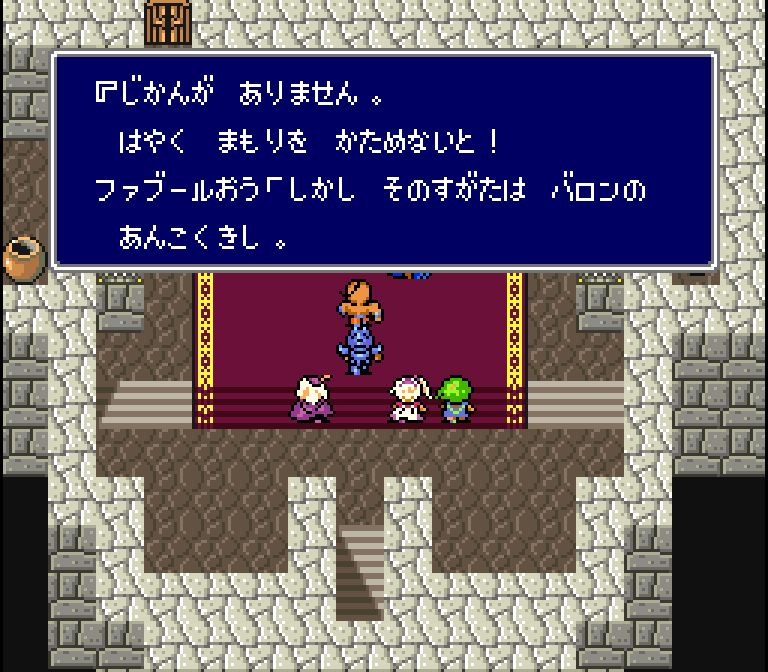 | 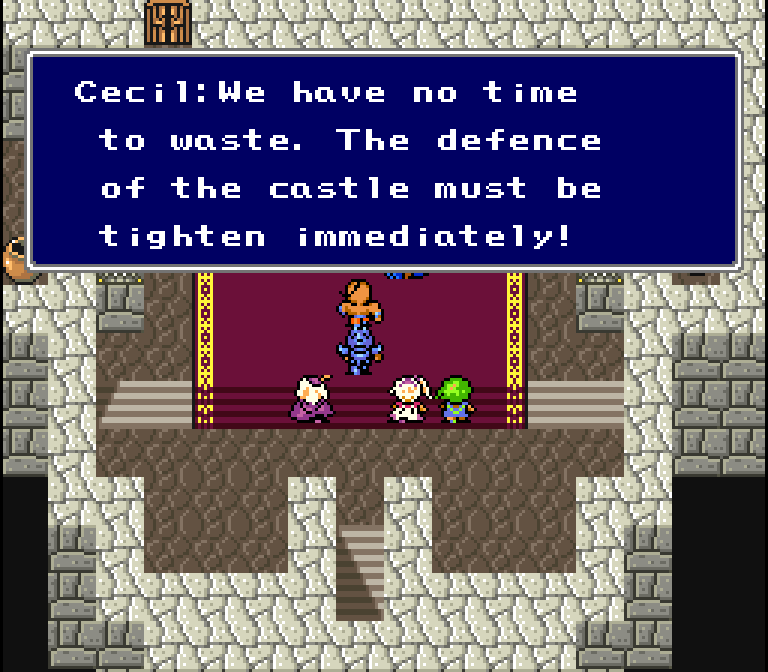 |
| Final Fantasy IV (Super Famicom) | Final Fantasy II (Super NES) |
Once you enter the throne room, a long scene begins with the king of Fabul. Here’s a look at it:
| Japanese Version (basic translation) | English Translation |
| King of Fabul: Yang, you’re back. | King of Fabul: Yang… |
| Yang: Yes. | Yang: King! |
| Yang: More importantly, King Fabul. One named Golbeza is in control of Baron and will be coming to steal the crystal! | The Baronian Kingdom mobilized his force to get our Crystal of Air! The one called Golbez is behind this attempt. |
| King of Fabul: Truly!? | King of Fabul: Truly!? |
| Yang: These kind people came here to inform us about it. | Yang: These people here came to let us know |
| King of Fabul: Who are these people? | |
| Cecil: There’s no time. You must tighten the defenses at once! | Cecil: We have no time to waste. The defence of the castle must be tighten immediately! |
| King of Fabul: However, you appear to be a Dark Knight of Baron. I’m not certain if I can trust you or not… | King of Fabul: But you’re a Dark Knight of Baron. Can I really trust you? |
| Yang: King! They can be trusted! They saved me when I was attacked… | Yang: King! They are trustworthy! They came to my defence when I was attacked. |
| Cecil: We’re in a race against time! | Cecil: Not a moment is to be lost! |
| Rosa: Please hurry! | Rosa: There is no time! |
| Gilbert: It’s been a long time, King Fabul. | Edward: I am glad to see you again, sir. |
| King of Fabul: Oh, Prince Gilbert! | King of Fabul: Oh, Prince Edward! |
| Gilbert: Damcyan was attacked and had its crystal stolen as well! | Edward: Damcyan, too, has suffered from the attack and had the crystal taken away! |
| I lost my father, my mother… and even my lover…! | I lost my parents and beloved friend! |
| Do you want Fabul to befall the same fate as Damcyan!? | Would you let the same thing happen to Fabul!? |
| King of Fabul: My apologies! So it is the truth… | King of Fabul: I’m sorry for the misunderstanding. |
| However, without our main force, the monk squad… | |
| Would you kind people lend us your help too? | Will you help us defend the crystal? |
Since this is a big piece of text, I’ll analyze it in list form for easy viewing. Here are some points of interest:
- The English text uses the sentence: “The Baronian Kingdom mobilized his force to get our Crystal of Air!” There’s something clearly wrong with this and the use of “his”. In fact, this whole English line is really weird and not very much like the original text at all.
- As before, the Japanese text just says “crystal” while the English text specifies which exact crystal is meant.
- In Japanese, the king asks who Cecil and his friends are. This line is missing from the translation.
- The English text uses the word “defence”. I remember thinking this was a really weird spelling when I was a kid – only later on did I realize this is the British-style spelling of “defense”. What’s strange is that it’s spelled “defense” elsewhere in the game, so why the inconsistency? My guess is that either multiple translators worked on the script or that “defence” was used everywhere in the first draft of the translation but someone who was cleaning up the script changed most (but not all) of them to “defense”.
- “The defence of the castle must be tighten immediately!” is poor and incorrect English. It’s pretty clear by now that this text and most of Fabul’s text didn’t get looked over by a native speaker.
- Gilbert says that he lost his “lover” in the Japanese version but just his “beloved friend” in the English translation.
- Before the king asks for Cecil’s assistance, he says in Japanese, “However, without our main force, the monk squad…” This explains why he needs Cecil’s help. The English text leaves this out and thus makes it the job of the player to figure out why a king would want complete strangers to defend his castle.
- I’m impressed with Cecil’s “Not a moment is to be lost!” line in the English text!
Do You Do Do
 | 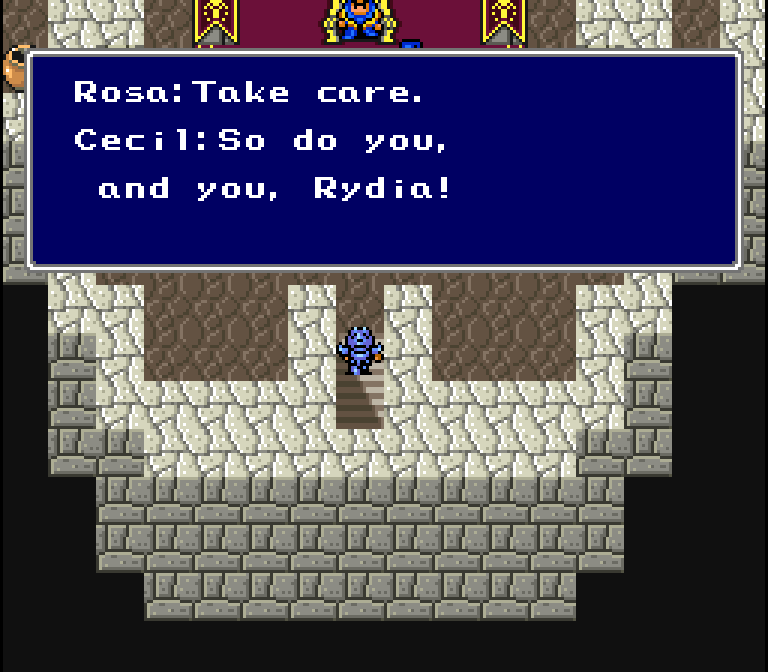 |
| Final Fantasy IV (Super Famicom) | Final Fantasy II (Super NES) |
After this, you can choose to answer with “yes” or “no”. If you decline to help, you basically have to redo the entire scene until you finally do say yes.
Once you agree to help, another short scene plays out. The king asks Rosa and Rydia to help tend to the wounded, so the girls leave the party. Just as Cecil is about to leave, this exchange happens:
| Japanese Version (basic translation) | English Translation |
| Rosa: Be careful, okay? | Rosa: Take care. |
| Cecil: You, too… | Cecil: So do you, and you, Rydia! |
| Rydia! I leave Rosa in your hands! |
Wow, that’s some wacky English.
Besides that, we see that in Japanese he doesn’t actually tell Rydia to take care – he instead tells Rydia to look after Rosa and make sure nothing happens to her. Spoiler: It doesn’t work out so well for Rosa.
Anyway, it’s again clear that this was translated by a non-native English speaker and not really looked over by a native editor.
Breaking the Fourth Wall
Actually, if you’re playing the PlayStation version and you say “no” to the king’s question, the director of the game gets mad and calls for the scene to end by saying, “Cut! Cut! Cut!”

It really feels like the PlayStation translation has that, “Whatever, let’s just goof around and do our own thing.” vibe to it. It’s a shame it served as the basis for later translations, although luckily this particular instance of wackiness was left out of other translations.
The Long Battle
Baron begins its invasion of Fabul, and it’s up to Cecil and friends to save the day.
In the very first battle, you face some soldiers. In Japanese, they’re led by an enemy called a “Captain”. In English, this was changed to “General”.
This is very strange, because back in Kaipo we saw a similar enemy have its name changed. I wonder why they did this.
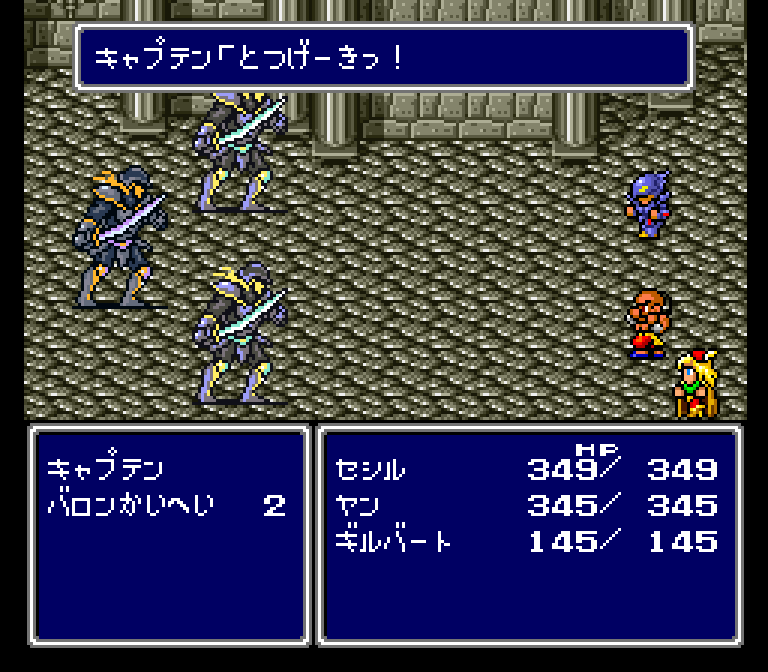 | 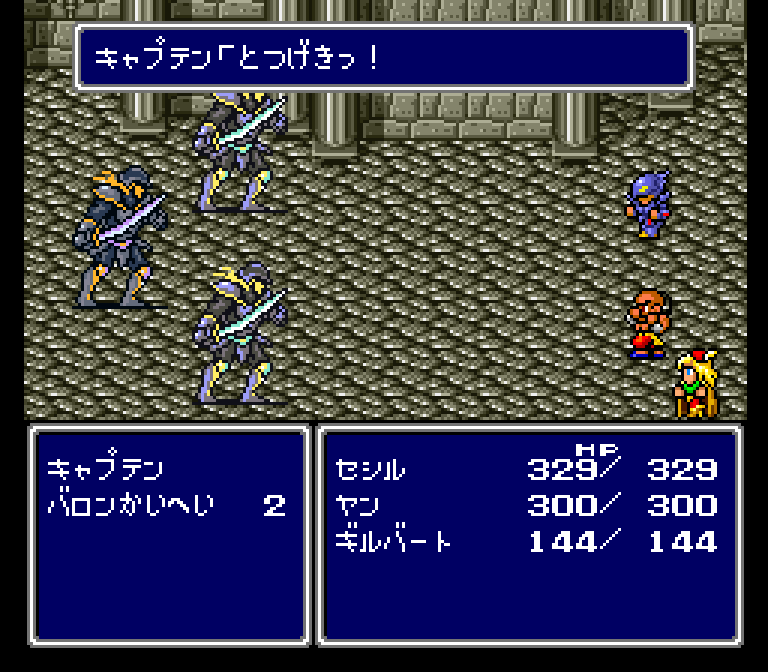 | 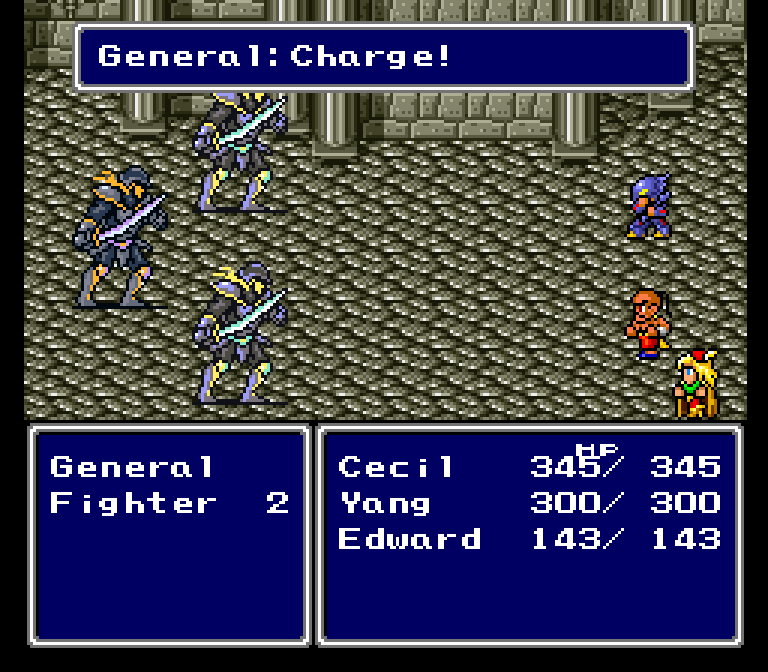 |
| Final Fantasy IV (Super Famicom) | Final Fantasy IV Easy Type (Super Famicom) | Final Fantasy II (Super NES) |
Every so often in this battle, the lead enemy will shout out to his subordinates.
In Final Fantasy IV, he says, “Chaaaarge!” while in Final Fantasy IV Easy Type and Final Fantasy II he just says, “Charge!”
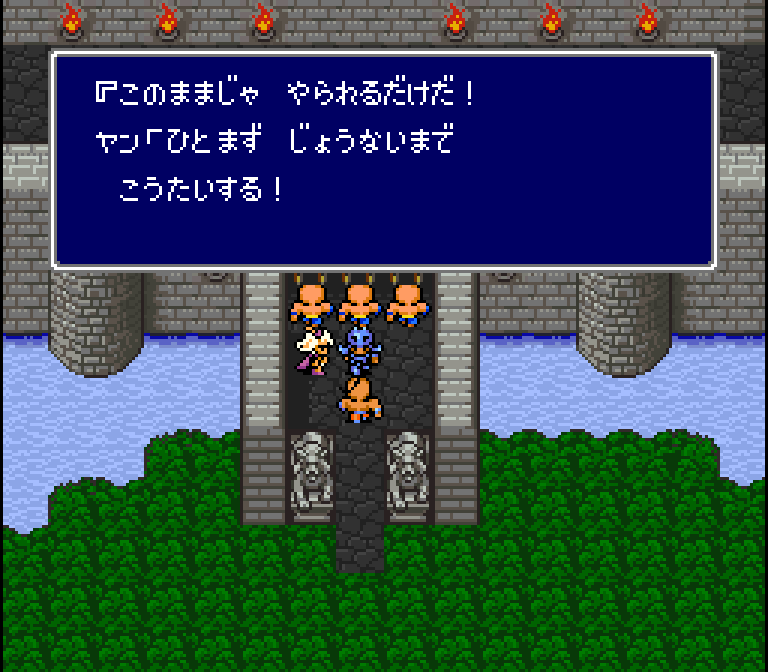 |  |
| Final Fantasy IV (Super Famicom) | Final Fantasy II (Super NES) |
After the first battle, the Red Wings start bombing the castle. Cecil and Yang then say this:
| Japanese Version (basic translation) | English Translation |
| Cecil: At this rate, we’ll just be done in! | Cecil: We can’t fight back the Airships! |
| Yang: For now let’s withdraw back into the castle! | Yang: Retreat! |
So Cecil’s line was slightly changed and Yang’s line was considerably shortened.
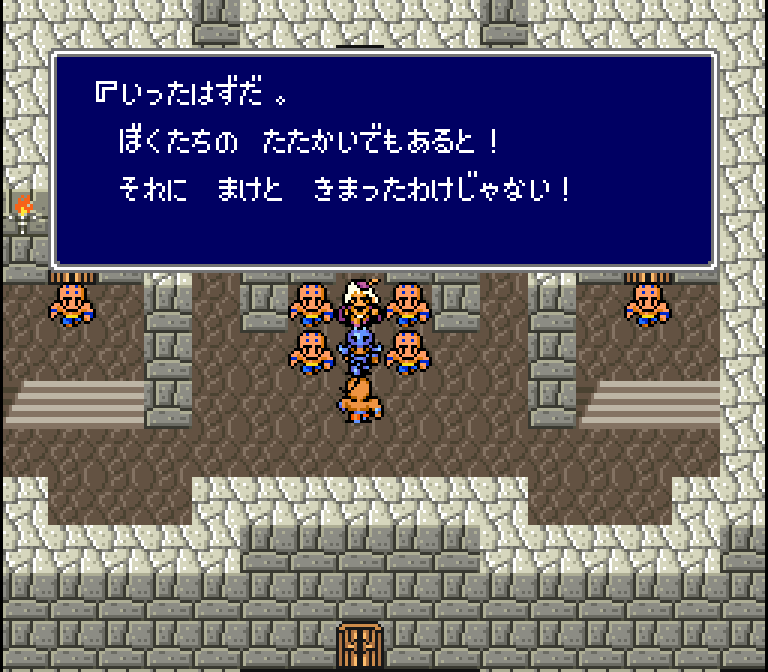 | 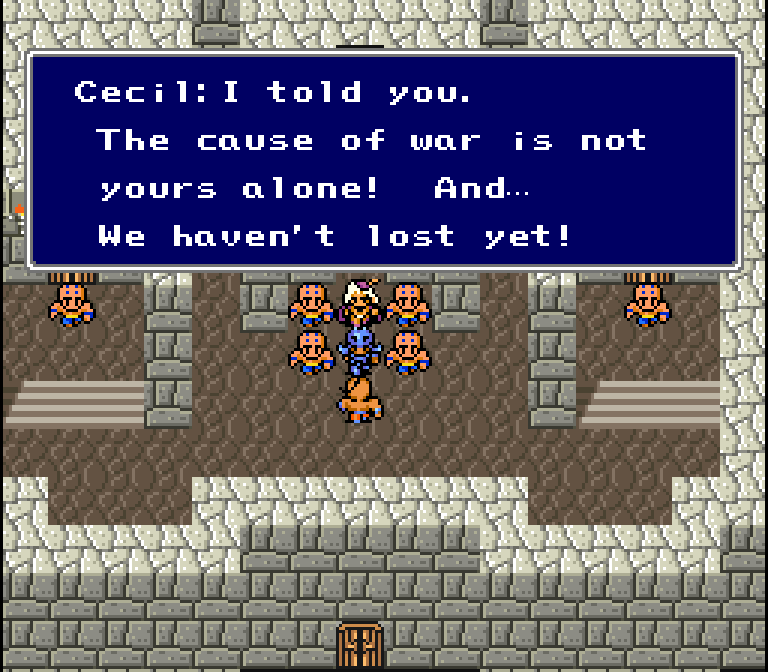 |
| Final Fantasy IV (Super Famicom) | Final Fantasy II (Super NES) |
Now inside the castle, Yang apologizes to Cecil for dragging him and his friends into a futile battle in this scene:
| Japanese Version (basic translation) | English Translation |
| Yang: I’m sorry! I dragged you into an unwinnable battle! | Yang: Sorry! I dragged you into a hopeless war! |
| Cecil: I told you before – this is our battle too! Besides, it’s not set in stone that we’ve lost! | Cecil: I told you. The cause of war is not yours alone! And… We haven’t lost yet! |
| Gilbert: Th-they’re coming! |
Cecil’s text has been changed in the English translation and sounds awkward to boot.
On top of that, Edward’s line was cut out of the English translation. The guy has the worst luck!
 | 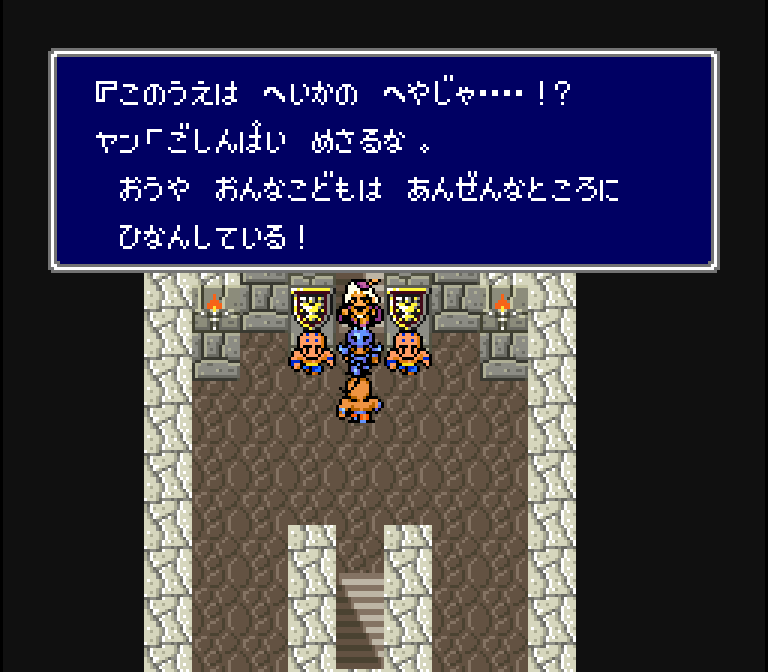 | 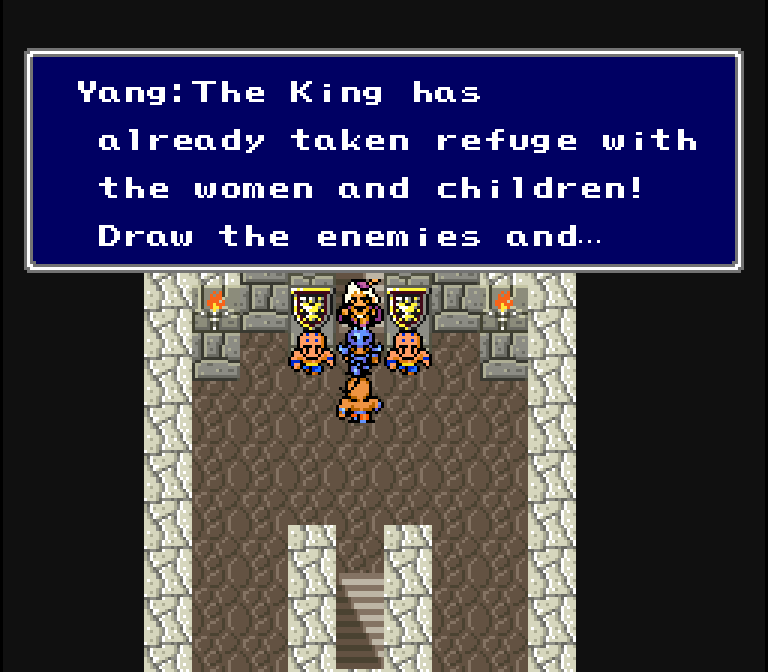 |
| Final Fantasy IV (Super Famicom) | Final Fantasy IV Easy Type (Super Famicom) | Final Fantasy II (Super NES) |
After some fighting, Yang and Cecil talk some more. Here’s how it goes:
| Final Fantasy IV (basic translation) | Final Fantasy IV Easy Type (basic translation) | Final Fantasy II (Super NES) |
| Cecil: Isn’t the king’s chamber upstairs…!? | Cecil: Isn’t the king’s room upstairs…!? | |
| Yang: Worry not. The king, the women, and the children have all fled to a safe place! | Yang: Worry not. The king, the women, and the children have all fled to a safe place! | Yang: The King has already taken refuge with the women and children! |
| We’ll draw the enemy away… | We’ll draw the enemy away… | Draw the enemies and… |
| ..and strike them down! | ..and strike them down! | Yang: Smash ’em! |
Here, Cecil’s line is completely gone. I guess he has no worries that they’re heading for the king’s throne room.
Speaking of which, in Final Fantasy IV and Final Fantasy IV Easy Type the throne room is called something like “King’s Chamber”. They use the exact same word. Yet here they decided to change it to say “room” instead for Easy Type. I have no idea why they’d do that.
What’s more, both phrases are confusing to begin with – it makes it sound like the king’s bedroom is up above. But no, his bedroom is in the right tower.
In all, this naming scheme is a little wonky in all three versions. Maybe that’s why Cecil’s line was left out of the English translation?
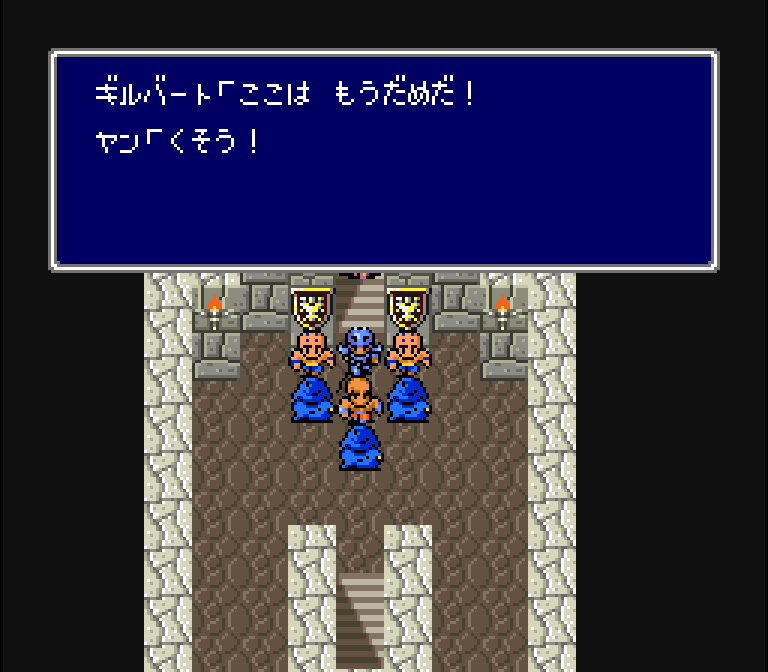 | 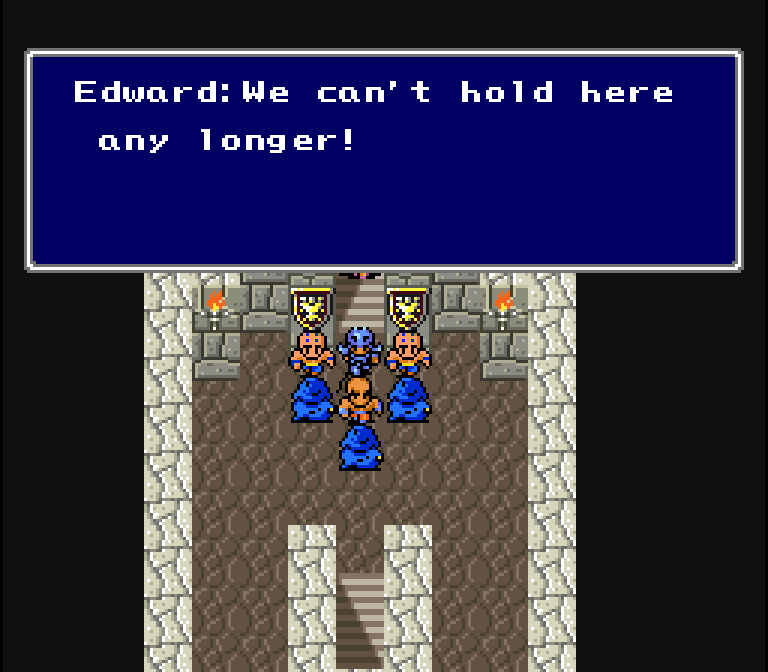 |
| Final Fantasy IV (Super Famicom) | Final Fantasy II (Super NES) |
After another wave of enemies, the party characters say this:
| Japanese Version (basic translation) | English Translation |
| Gilbert: We can’t hold this position any longer! | Edward: We can’t hold here any longer! |
| Yang: Damn! |
Yep, Yang’s swearing was removed. Damn!
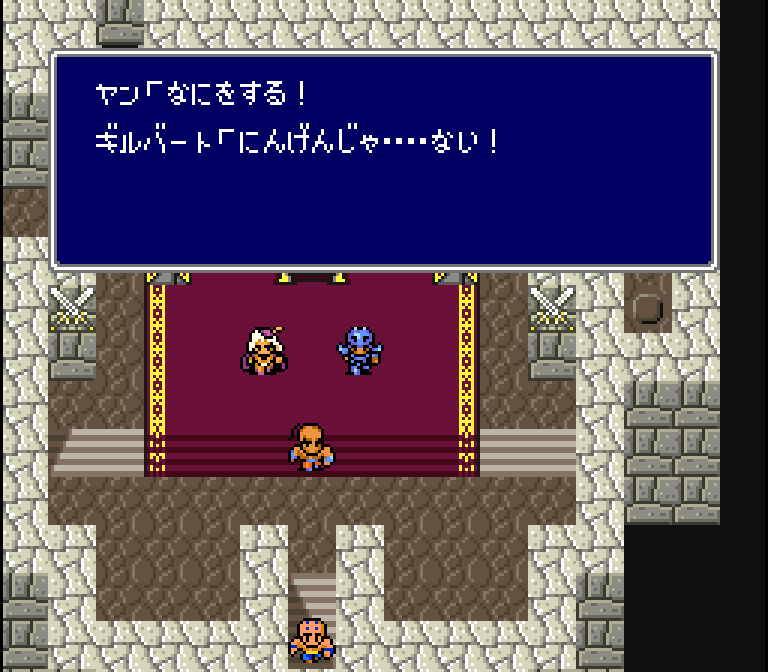 |  |
| Final Fantasy IV (Super Famicom) | Final Fantasy II (Super NES) |
Once in the throne room, a monk goes to lock the door to keep the invaders out… but he unlocks it instead! Here’s the party’s reaction:
| Japanese Version (basic translation) | English Translation |
| Yang: What are you doing!? | Yang: What!? What are you doing?! |
| Gilbert: He’s… not human! |
Gilbert’s line is completely removed in the English translation. What’s interesting is that from a few Japanese fan sites that I’ve read, this seems to have been a somewhat memorable line. Nothing spectacular, just one that stood out.
What’s also interesting is how Yang’s line was slightly expanded… and how it uses “!?” and “?!” for punctuation. I’m guessing the “!?” is there because the original text had it, but since some new text was added, there was no need to follow a punctuation order, resulting in “?!”.
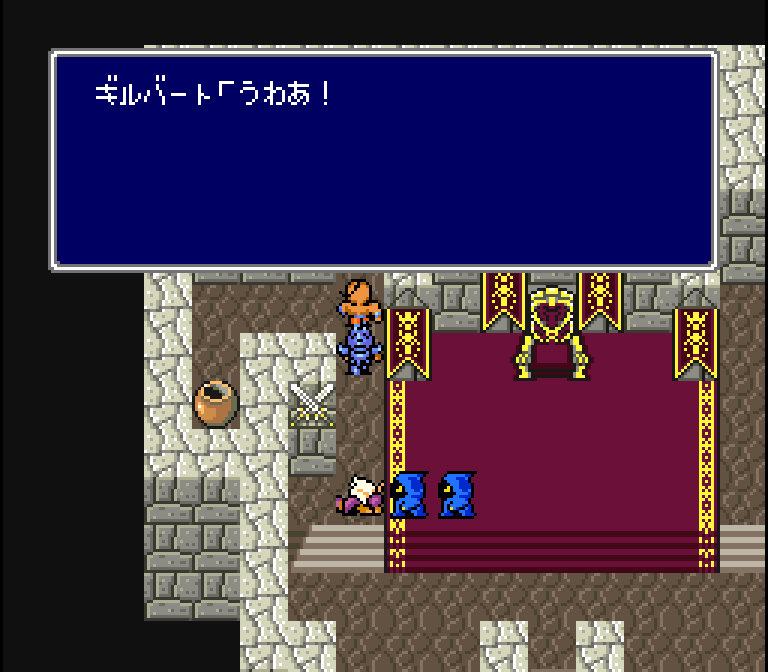 |  |
| Final Fantasy IV (Super Famicom) | Final Fantasy II (Super NES) |
As Cecil and friends make a run for the crystal room, Gilbert/Edward trips and falls.
In Japanese, he says, “Uwaa!” when he trips.
In English, he says, “No!”
So this is another case of where “Uwaa!” was translated as “No!”. I can understand why it’s a weird thing to translate, but I feel like they could’ve gone with something better than “No!”. It changes the nuance, but then again it doesn’t really matter in the end.
Long Time No See
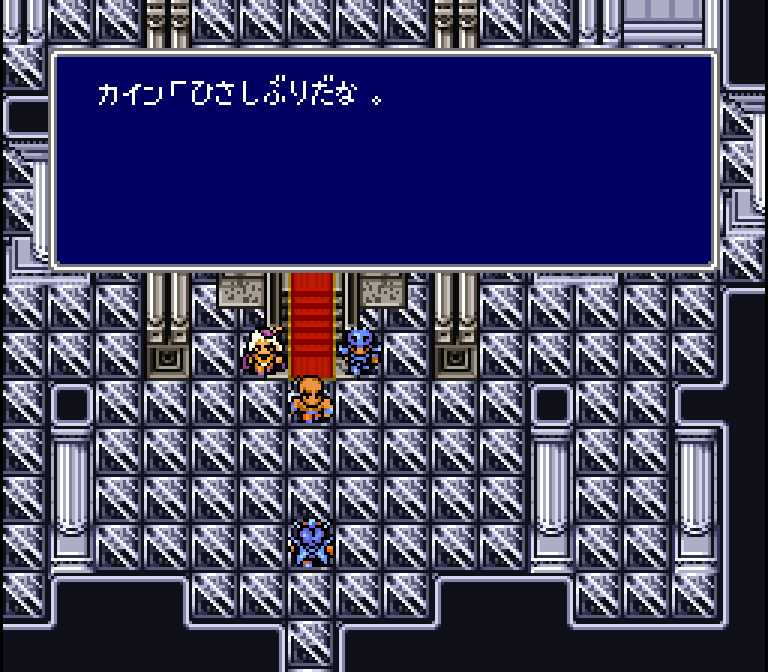 |  |
| Final Fantasy IV (Super Famicom) | Final Fantasy II (Super NES) |
Inside the crystal room, Kain suddenly shows up.
In Japanese, he says something like, “It’s been a while.”
In the English text, he says the same basic thing: “It’s been awhile, Cecil.”
Two things here – first, “Cecil” was added to the line, and second, “awhile” is incorrect English. There sure have been lots of these mistakes in Fabul.
Dragoon Mania
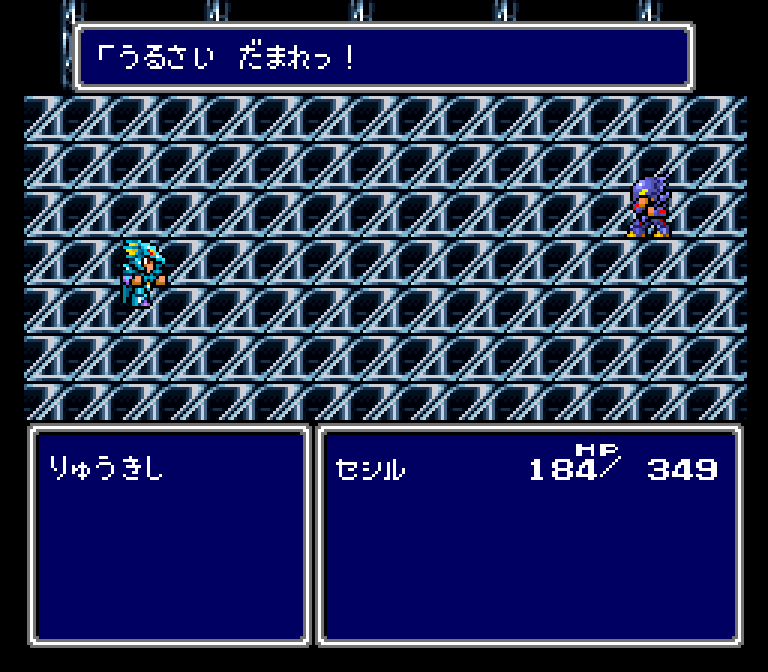 | 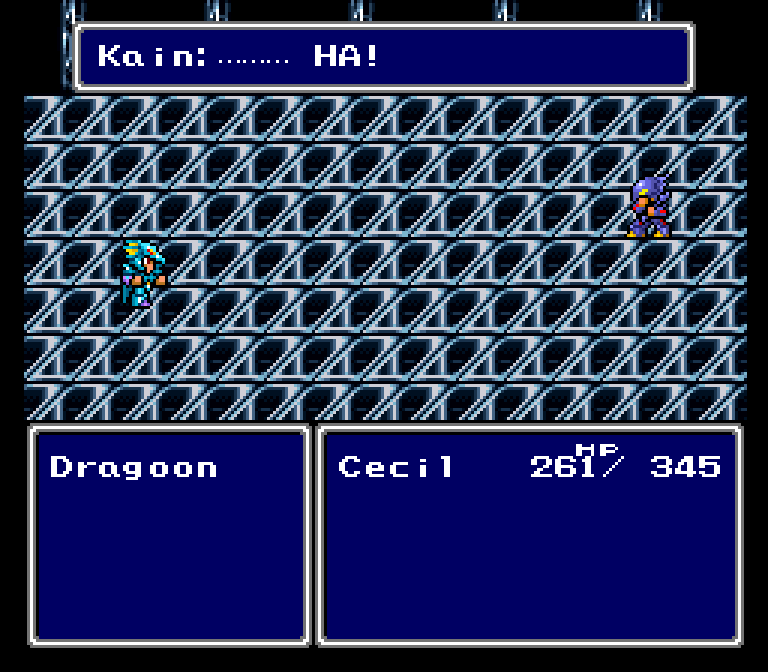 |
| Final Fantasy IV (Super Famicom) | Final Fantasy II (Super NES) |
For some reason, Kain is acting evil and challenges Cecil to battle.
Kain talks during the battle. Here’s what he says:
| Japanese Version (basic translation) | English Translation |
| Cecil: Why!? Cain! | Cecil: Kain!? Kain! |
| Cain: Enough talk! | Kain: …… |
| Cecil: Just what happened to you!? | Cecil: What’s wrong? |
| Cain: Shut up! Be quiet! | Kain: …… HA! |
| Cain: Cecil! Now to finish you off! | Kain: Got you! |
Very different. Without context, it actually almost sounds like Kain is laughing and just say, “Haha, just teasing you!”
Anyway, I can see how “Just what happened?” would be translated as “What’s wrong?” But all the rest is just like… wow, what a way to mess with a key scene in the game.
Dark Evil Bad Dude
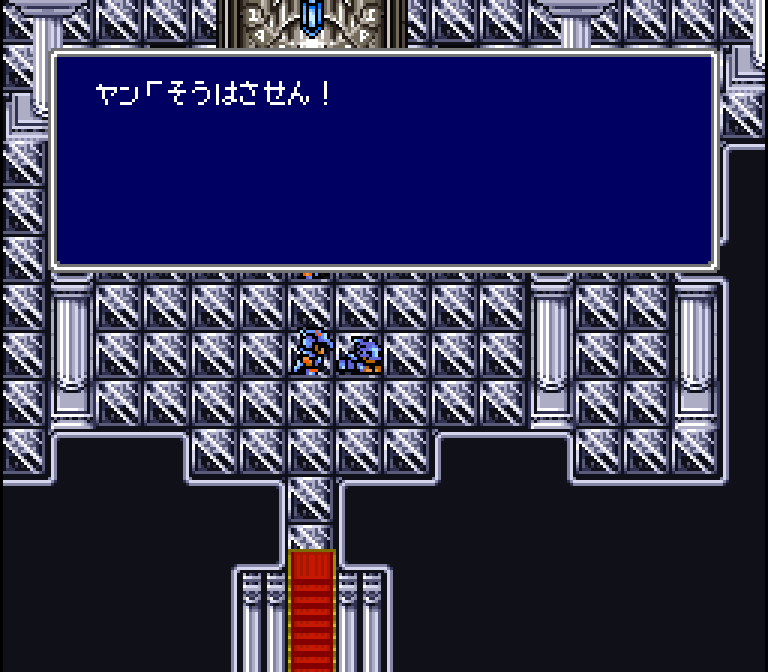 | 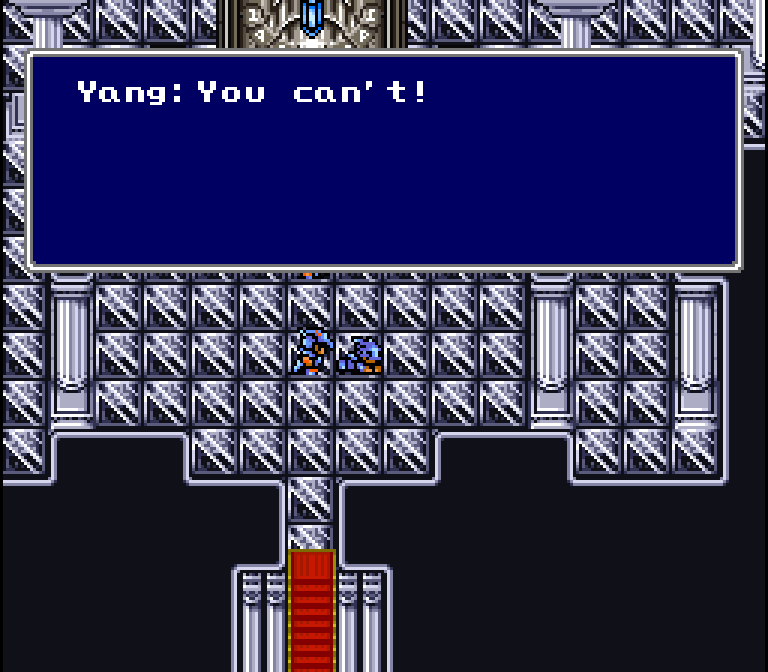 |
| Final Fantasy IV (Super Famicom) | Final Fantasy II (Super NES) |
After the battle, another scene unfolds:
| Japanese Version (basic translation) | English Translation |
| Cecil: Don’t tell me you’re working for Golbeza too! | Cecil: You are under Golbez’s… |
| Cain: I’ll put you out of your misery now! | Kain: I’ll put you out of your misery. |
| Yang: I won’t let you! | Yang: You can’t! |
| — | — |
| Stop! | NO!! |
| Cain: Rosa! | Kain: Rosa! |
| Rosa: Not you too, Cain! | Rosa: Kain, why you! |
| Cain: U… Uu! Don’t… look at me! | Kain: Don’t look at me! |
What I find most interesting is:
- Yang’s forceful, resolute remark in the Japanese text becomes almost a sort of sad plea in the English translation. I’m sure this was unintentional, though.
- Rosa shows shock in the Japanese text, but the English text just makes her sound 100% angry instead.
- Kain is clearly more troubled by Rosa’s presence in the original text.
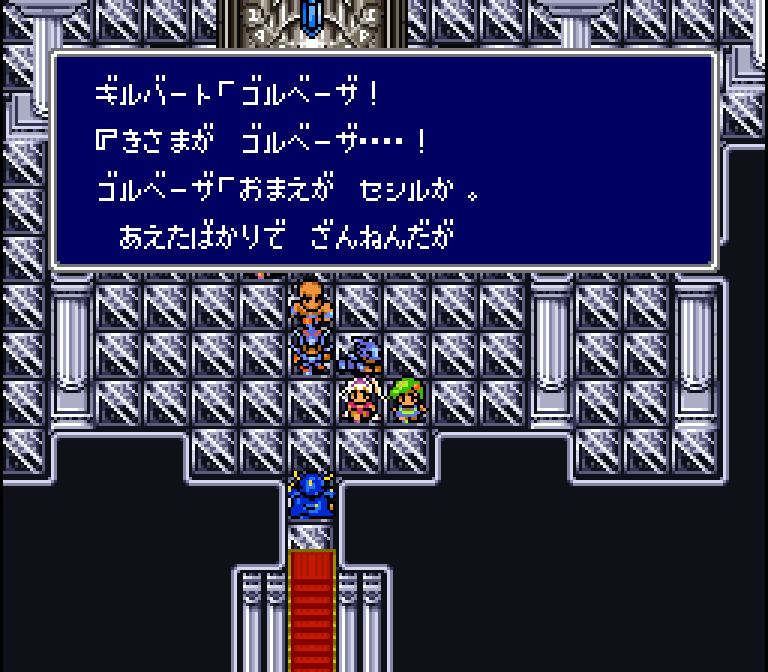 | 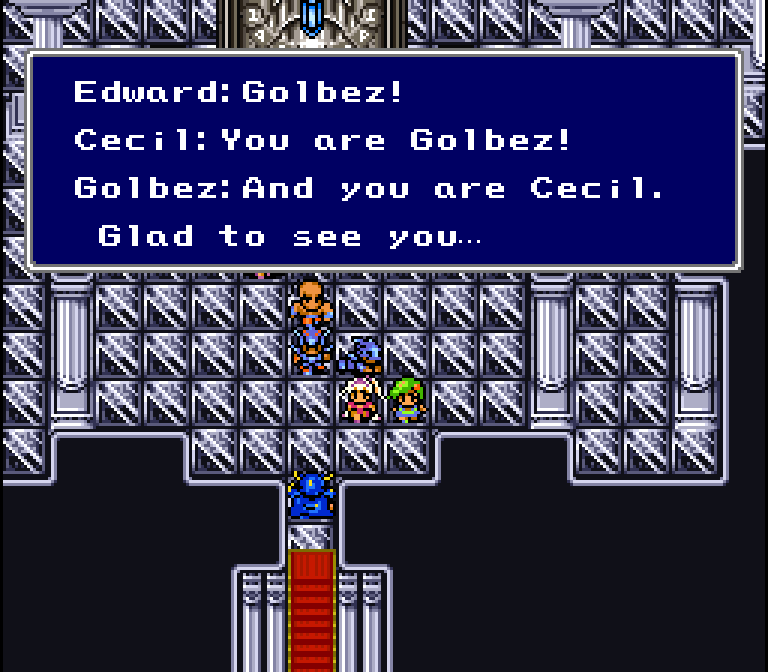 |
| Final Fantasy IV (Super Famicom) | Final Fantasy II (Super NES) |
At this point, Golbez shows up. It’s the first time in the game we see him. Here’s how the scene plays out once he’s made his surprise appearance:
| Japanese Version (basic translation) | English Translation |
| Gilbert: Golbeza! | Edward: Golbez! |
| Cecil: So you’re Golbeza…! | Cecil: You are Golbez! |
| Golbeza: So you’re Cecil? | Golbez: And you are Cecil. |
| It’s a shame, having just met, but this is my greeting to you! | Glad to see you… and take my greeting! |
| Gilbert: Cecil! | Edward: Cecil! |
| Yang: We won’t let you! | Yang: No! |
Here we see that Golbez and Cecil’s short exchange is a little different in the translation. The “glad to see you” line isn’t in the original text, and doesn’t even sound like something Golbez would say.
We also see that Yang’s line has been changed from something forceful and tough to something weaker and passive.
But the real topic of note here is how the character is called “Golbeza” in Japanese but just “Golbez” in English.
For a while, this change puzzled me, but then someone pointed out that it’s because names of party members can only have six letters at most. Golbez is never actually in your party in the game, but he appears in some special battles later on as a party member-like entity. So that means his name had to be trimmed down to six letters, and then this change had to be made throughout the entire translation.
The name “Golbeza” is very strange, so I was curious to know what it might’ve been based on. Some Japanese fans say that it was the name of venomous insects/flies that sprung forth from the corpse of a dragon in one of the legends about Saint George. Apparently the Japanese DS remake also added in a line where Zeromus calls Golbeza a “venomous insect”.
Anyway, these legendary insects supposedly got their name from the region where the story took place. It’s all pretty confusing and crazy, but the current belief is that “Golbeza” is from the name “Golubaeser”, which is an actual place that exists and is known today as Golubac.
There’s obviously a lot of uncertainty to all of this, but the above is what I’ve been able to find from Japanese fan sites and English-language fan sites.
 | 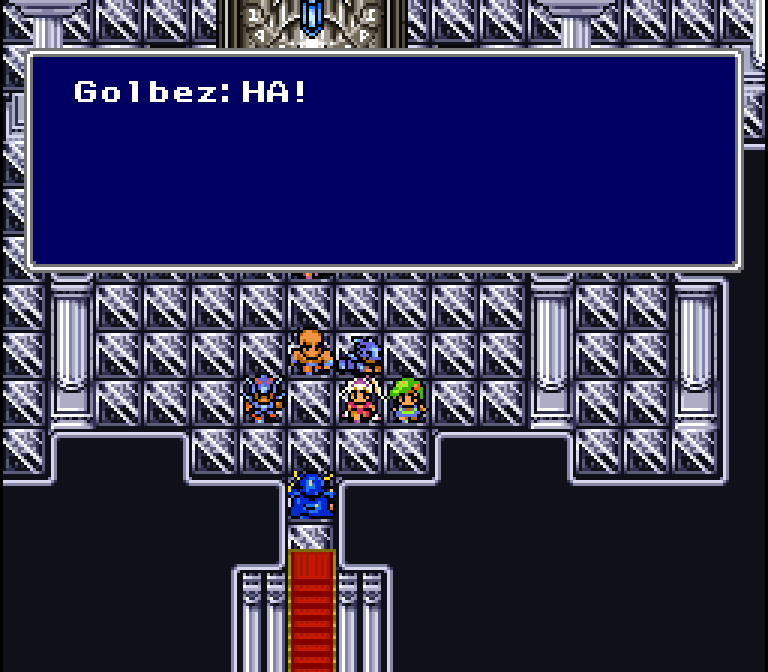 |
| Final Fantasy IV (Super Famicom) | Final Fantasy II (Super NES) |
Now let’s get back to the scene at hand!
| Japanese Version (basic translation) | English Translation |
| Golbeza: I’ve no business with you insects!(shoots lightning at Yang and Gilbert) | Golbez: HA!(shoots lightning at Yang and Edward) |
| Golbeza: Cain… That’s enough playtime. Take the crystal now. | Golbez: That’s enough. Take the crystal, Kain. |
| Cain: Yes, sir! | Kain: Yes, Master! |
| Rosa: Stop, Cain! | Rosa: No, Kain! |
| Cain: ! | Kain: ! |
| Cecil: Stay back, Rosa…! | Cecil: Don’t! |
| Golbeza: Oh? This girl is that important to you? | Golbez: Is this girl so important to you? |
| In that case, I shall take her with me. I’d very much like to meet you again. This is a token of that promise. | Very well! I shall see you again. I’m taking her as a token of this promise. |
| Let us go, Cain! | Come, Kain! |
| Cain: You narrowly escaped with your life, Cecil! | Kain: You had a narrow escape, Cecil! |
| Cecil: Wait…! | Cecil: W-wait! |
| Cecil: Ugh… | Cecil: Rosa… |
Here are the key points to take away:
- Golbez’s line about insects was changed simply to, “HA!” As we just saw, this same thing happened to Kain’s in-battle text just a moment ago. I wonder what gives.
- Kain responds to Golbez in English by saying, “Yes, Master!” But in Japanese he just answers in a sort of military way or a way often seen when a subordinate acknowledges and agrees to a superior’s orders. But there’s no “slave and master” connotation at all in the Japanese text. Basically, you’re supposed to be confused and think that Kain has willingly rejoined Baron’s military for some reason. But here the English text gives away the fact that Kain has instead been brainwashed. That’s a revelation that isn’t supposed to come until much later in the game.
- In the English text, Cecil says, “Don’t!” The thing is, it’s unclear who he’s saying this to right away, so it sounds like he’s trying to tell Kain not to steal the crystal. In the Japanese text, he’s clearly talking to Rosa, so this ambiguity doesn’t exist. It also makes Golbez’s reaction flow a little more naturally.
- At the end, the English script has Cecil call out Rosa’s name. This wasn’t in the original script. Instead, he just makes an angry-but-helpless sort of sound. I have “ugh” there but that’s not really quite right.
I should also point out that Golbez talks in a really cool, intimidating way in Japanese. His style of talking is one of my favorites for some reason. It’s not unique to him or anything though; it’s commonly used in other games and stuff by cold, powerful, intimidating characters. I just like the way it sounds in Japanese.
Curing Time
 | 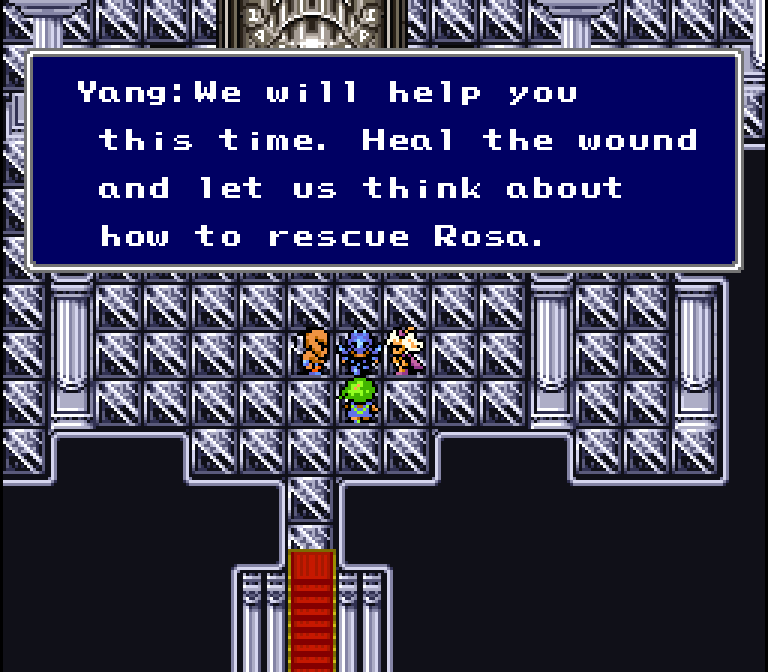 |
| Final Fantasy IV (Super Famicom) | Final Fantasy II (Super NES) |
After Golbez and Kain leave, Rydia shows up and heals everyone in the party. Then this scene begins:
| Japanese Version (basic translation) | English Translation |
| Rydia: Are you okay? | Rydia: You Okay? |
| Gilbert: Thanks, Rydia. But Rosa was abducted… | Edward: Thanks, Rydia. But Rosa was taken. |
| Yang: And we were unable to protect the crystal… | Yang: And the crystal. |
| Cecil: Rosa… | Cecil: Rosa… |
| Rydia: Pull yourselves together, guys! I’m sure Rosa is fine. And we can always take back the crystal! | Rydia: Come on! Rosa is all right. And we can take back the crystal, too! |
| Gilbert: …You’re right! | Edward: That’s right! |
| Yang: Sir Cecil! It’s our turn to help you. Let’s heal our bodies and devise a rescue plan. | Yang: We will help you this time. Heal the wound and let us think about how to rescue Rosa. |
| Cecil: Thank you… | Cecil: Thank you… |
And here are the points of interest:
- The “You Okay?” line in the English script has a capitalization error.
- In the Japanese text, Yang laments the fact that they weren’t able to protect the crystal. In the English text, this was changed and given a slightly different nuance.
- Yang’s line to Cecil is a little bit different, but nothing major.
- Yang says, “Heal the wound” in the English translation. As a kid I assumed he was referring to the emotional wound Cecil just suffered, but nope, he meant to say, “Let’s heal ourselves.” The whole sentence just sounds very awkward and like a non-native English speaker wrote it too.
Smaaash!
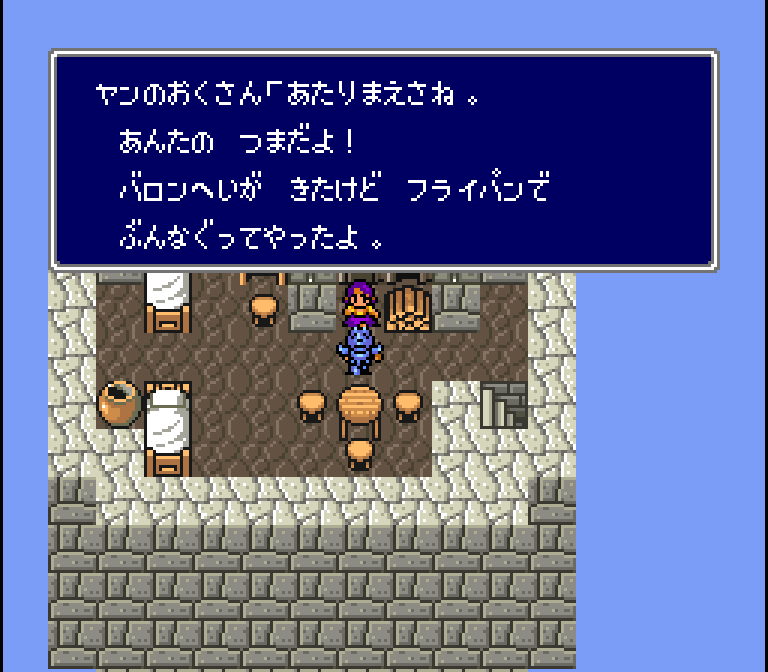 | 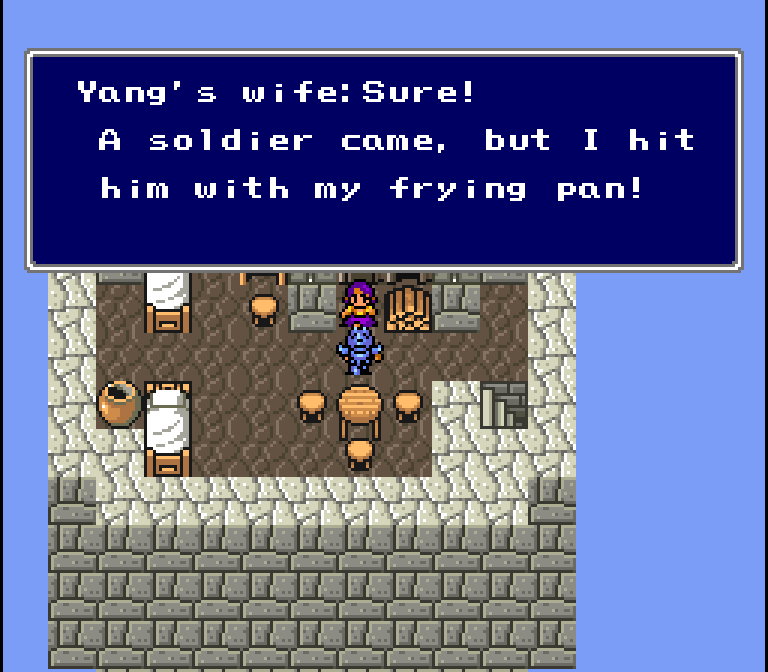 |
| Final Fantasy IV (Super Famicom) | Final Fantasy II (Super NES) |
Yang’s wife talks about how she fought off a Baron soldier with a frying pan.
When Yang asks if she was all right during the attack, she responds in Japanese, “Of course I was. I’m your wife!”
In English, she just says, “Sure!”
A Wish to Fly
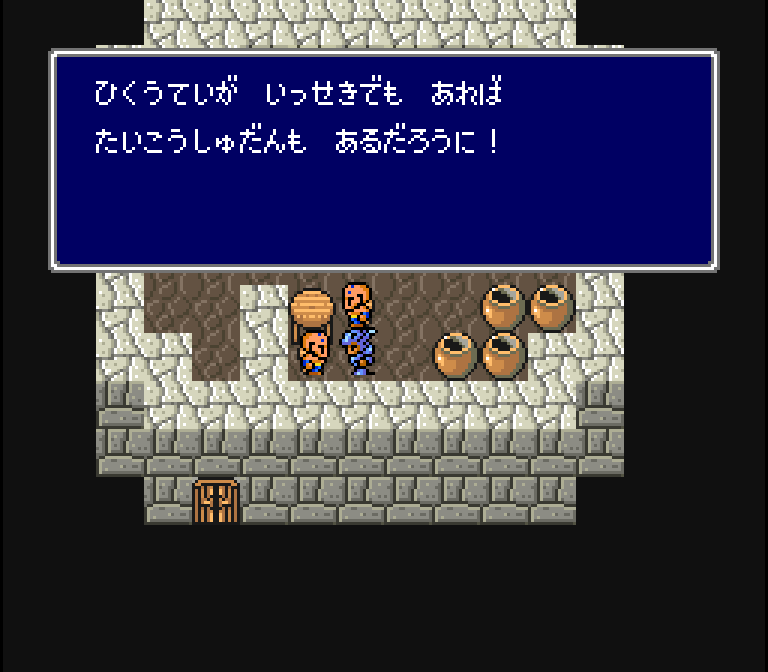 | 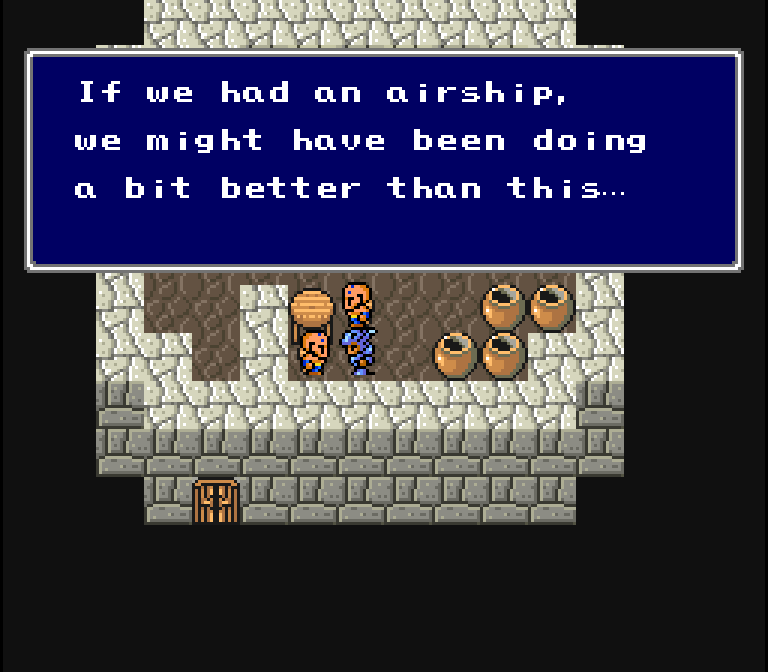 |
| Final Fantasy IV (Super Famicom) | Final Fantasy II (Super NES) |
A monk in the right tower says in the English script, “If we had an airship, we might have been doing a bit better than this…”
This is a bit awkward and off. In Japanese, it’s more like, “If we had even just one airship we would have a way of resisting them!”
Sneezy Boy
 | 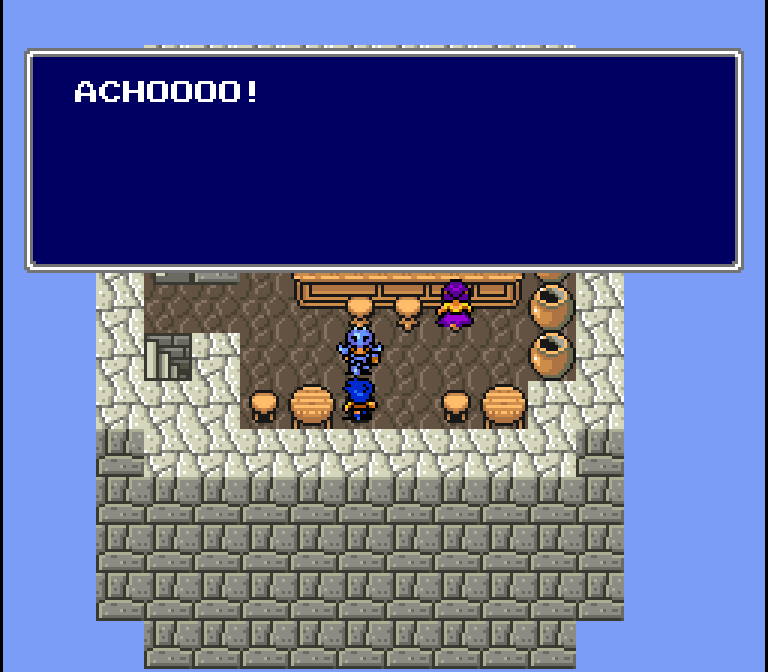 |
| Final Fantasy IV (Super Famicom) | Final Fantasy II (Super NES) |
The boy in the pub says, “ACHOOOO!” in the English script at this point in the game.
So far, we’ve seen that this was always how, “Hahh!” was translated. But this time the Japanese text says, “ACHOO!” too.
If you missed it, this “ACHOO” stuff is a generic martial art sound in Japanese. There are more details about it here.
Also, after this line, he says in English, “I wanna be strong like our Karate fighters!”
In Japanese, he says something like, “I can’t wait to train too!”
Town and Castle
 | 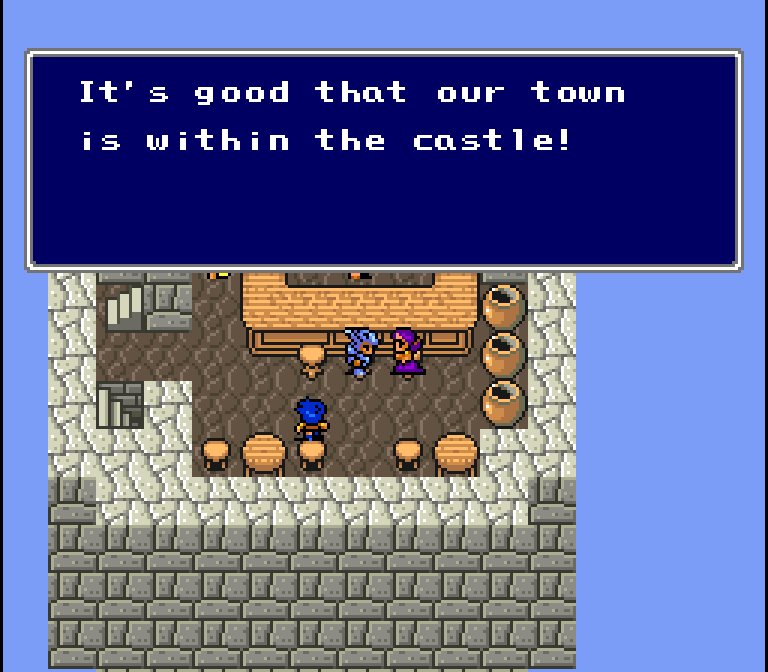 |
| Final Fantasy IV (Super Famicom) | Final Fantasy II (Super NES) |
The lady in the pub now says in English, “It’s good that our town is within the castle!”
In Japanese, she says a little more than that: “Thank goodness Fabul’s town is inside the castle. If it had been outside it, by now it would be…”
Nice Attack
 | 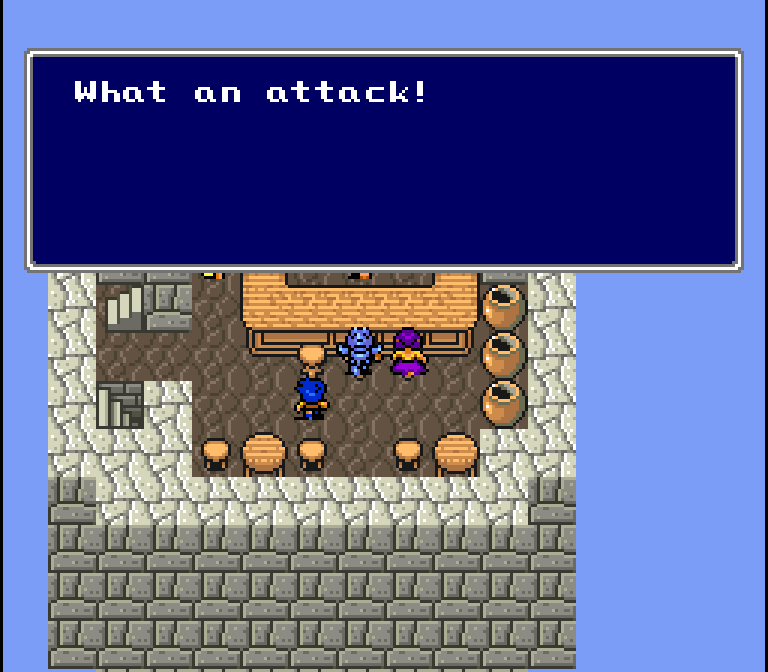 |
| Final Fantasy IV (Super Famicom) | Final Fantasy II (Super NES) |
The bartender says in English, “What an attack!”
This almost comes off as if he was impressed. But the Japanese line has a slightly different nuance: “Man, that was an intense attack.”
Royal Whippersnapper
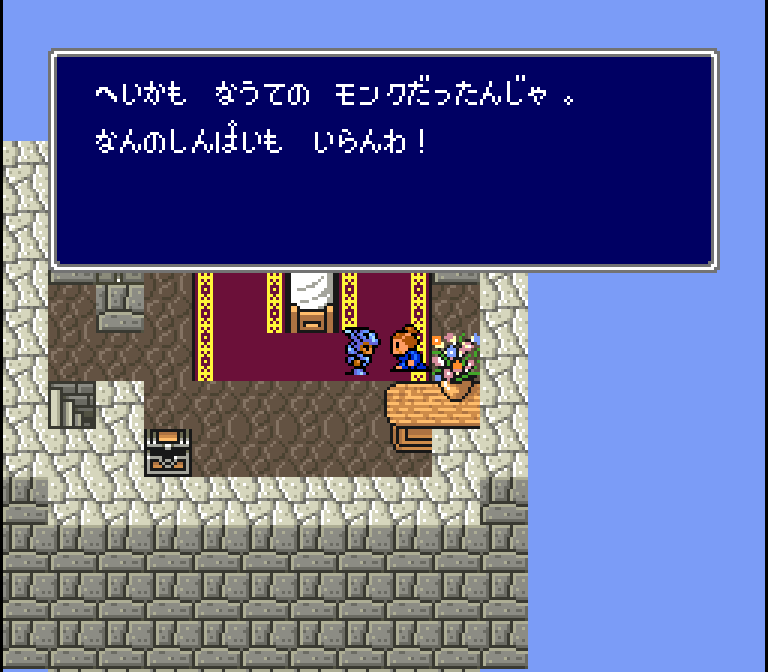 | 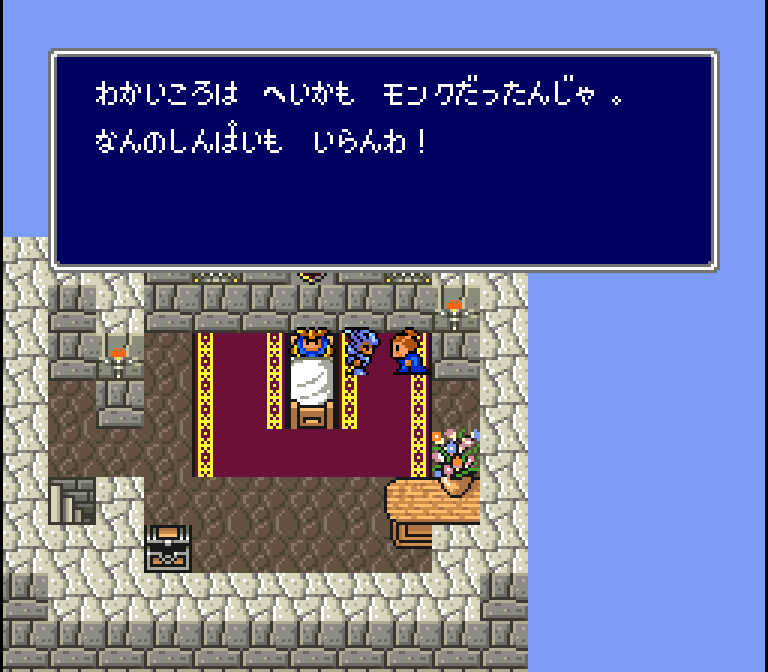 | 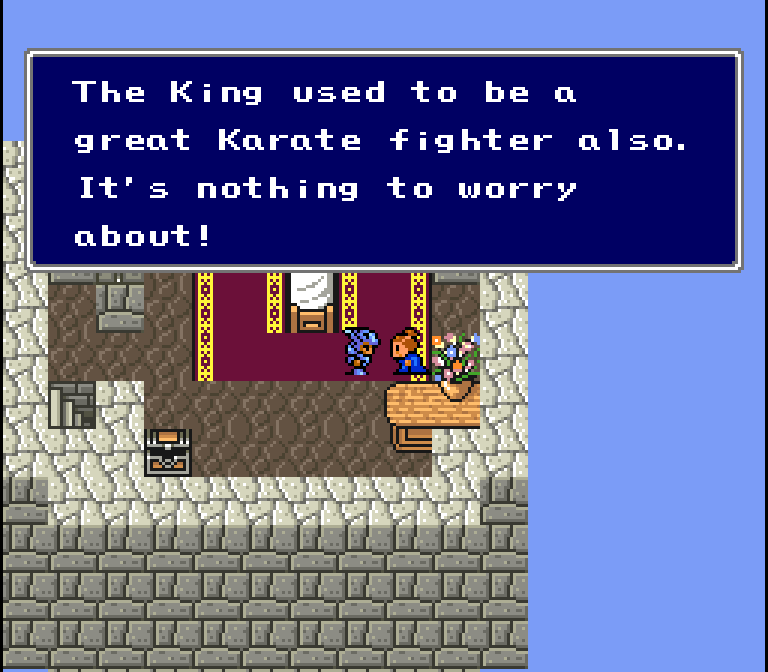 |
| Final Fantasy IV (Super Famicom) | Final Fantasy IV Easy Type (Super Famicom) | Final Fantasy II (Super NES) |
Back in the king’s bedroom, the old lady there has this to say:
| Final Fantasy IV (basic translation) | Final Fantasy IV Easy Type (basic translation) | Final Fantasy II (Super NES) |
| His Majesty was once a renowned monk. There’s nothing to worry about at all! | His Majesty was a monk when he was young. There’s nothing to worry about at all! | The King used to be a great Karate fighter also. It’s nothing to worry about! |
We see the “monk to Karate fighter” change again here, but it’s also evident that the English line is based on the original Final Fantasy IV’s line and not Final Fantasy IV Easy Type.
I think the Easy Type line was changed because this specific Japanese word for “renowned” or “famous” that’s used in the original line might’ve been too fancy and hard for younger players to understand.
Rest On
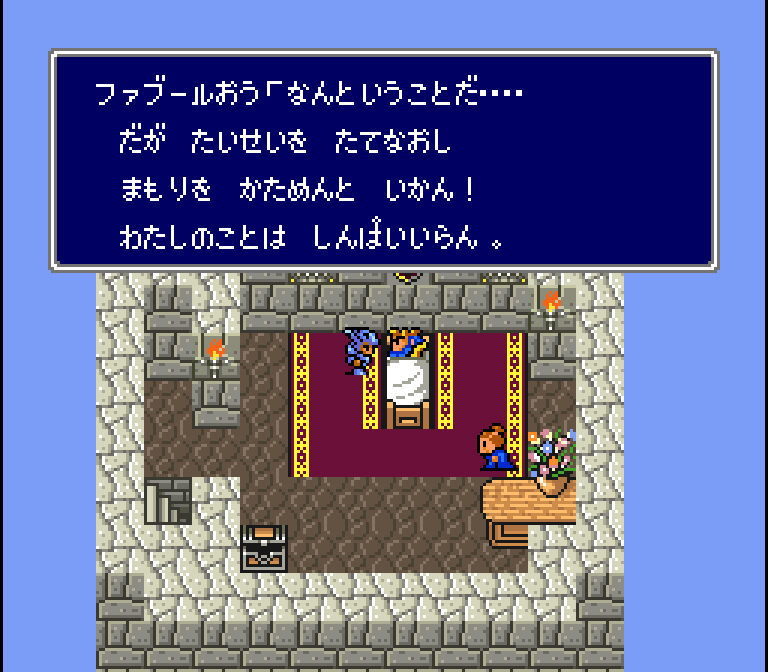 | 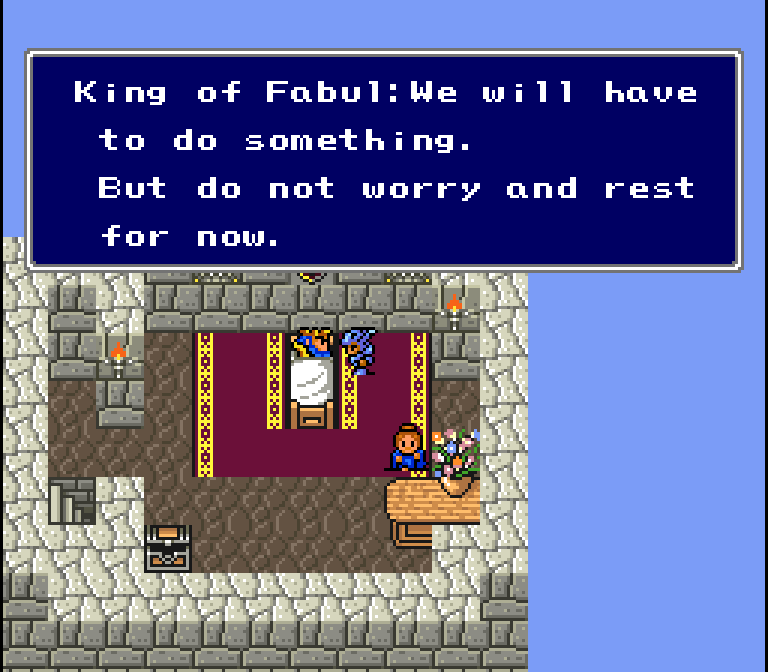 |
| Final Fantasy IV (Super Famicom) | Final Fantasy II (Super NES) |
The king has been wounded and is in bed. If you talk to him, here’s what he says:
| Japanese Version (basic translation) | English Translation |
| King of Fabul: This is terrible… | |
| But we must pull ourselves back together and tighten our defenses! | King of Fabul: We will have to do something. |
| You needn’t worry about me. For now, get some rest. | But do not worry and rest for now. |
The translated text in Fabul has really been getting the trimming treatment.
You’re No Help
 | 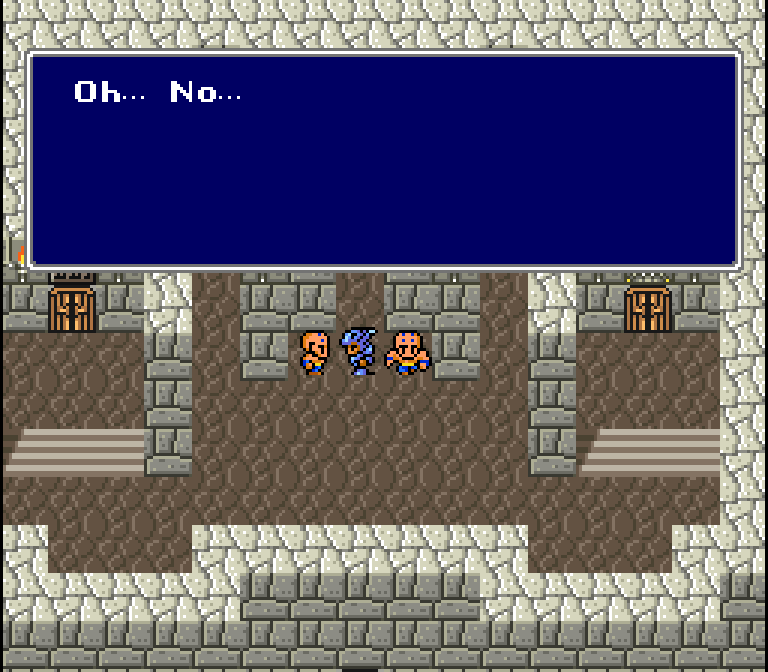 |
| Final Fantasy IV (Super Famicom) | Final Fantasy II (Super NES) |
After the battle, these monks in the castle now say in Japanese, “It was because of our shortcomings that…”
Assumedly, they’re saying that all the deaths and the theft of the crystal are due to their lack of skill. That’s gotta be a terrible feeling.
In English, they instead say, “Oh… No…”
A Friendly Chat
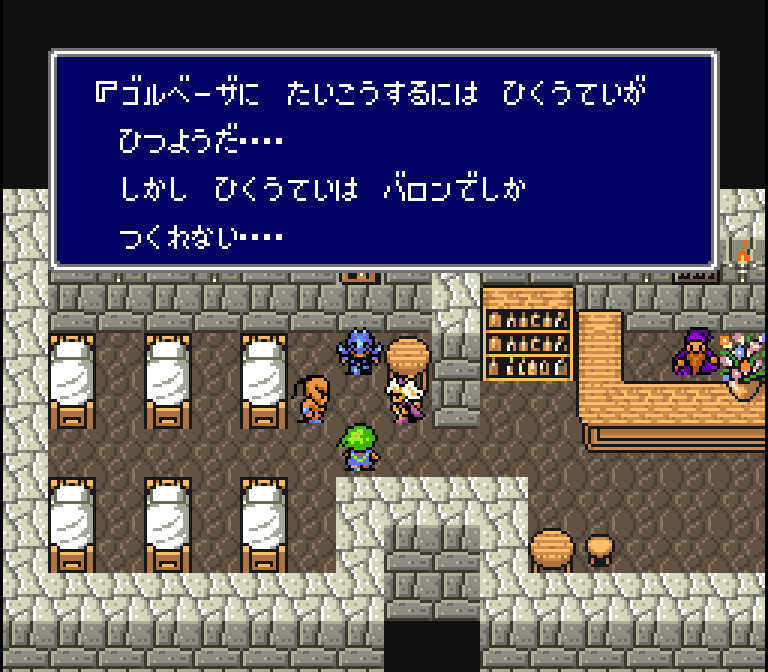 | 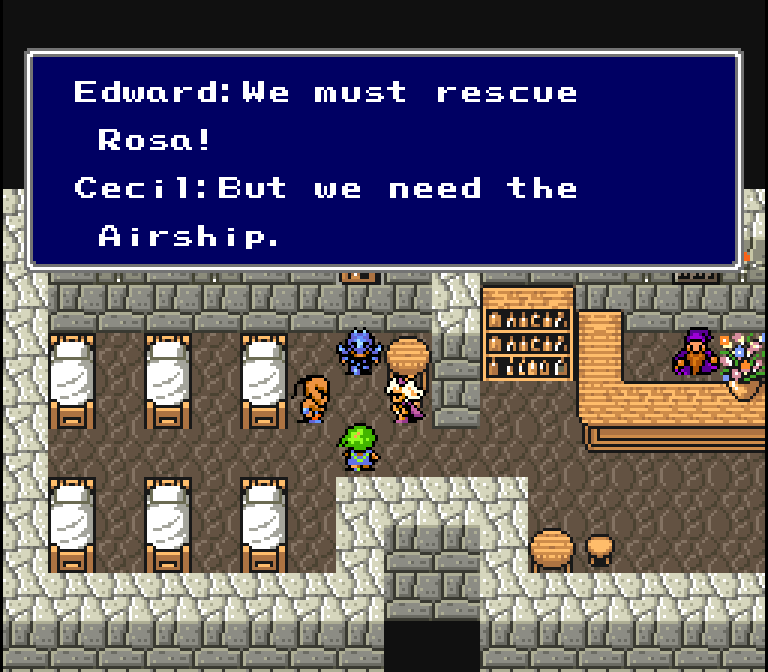 |
| Final Fantasy IV (Super Famicom) | Final Fantasy II (Super NES) |
At the inn, Cecil and friends discuss the current situation.
| Japanese Version (basic translation) | English Translation |
| Gilbert: We have to save Rosa! | Edward: We must rescue Rosa! |
| Cecil: To oppose Golbeza we’ll need an airship… But airships can only be built in Baron… | Cecil: But we need the Airship. Baron is the only one who has it. |
| Yang: I wonder if there isn’t some way to sneak into Baron. | Yang: Can’t we sneak in? |
| Cecil: Because the Red Wings are Baron’s main force, its naval forces are relatively thin. If we want to sneak in, then we should do it by sea…! | Cecil: Baron’s main force is the Red Wings. The Sea Power is relatively weak. Let’s make it on the sea! |
| Rydia: We’ll need a ship then. | Rydia: But how? |
| Yang: In that case, I will ask the king tomorrow morning to lend us a ship. You’ve done so much for us. I’m sure the king will cooperate. | Yang: I will ask the King for a ship. He will cooperate with you. |
| Cecil: Thank you… | Cecil: Thanks. |
| Yang: …Who was that Dragon Knight? | Yang: Who is that Dragoon? |
| Cecil: His name is Cain and… he used to be my best friend… We swore to escape Baron together, and yet… | Cecil: Kain who used to be my best friend. Together, we swore to get out of Baron. |
| Yang: I see… | Yang: I see. |
| Gilbert: …Anyway, let’s get some rest for today… | Edward: Anyway, we must take a rest now. |
| Cecil: … | Cecil: … |
Here are a few of the points of interest here:
- The exact purpose and reasoning for getting an airship is left out of the English translation. What’s more, it’s not that Baron is the only country that has airships – apparently Baron is the only country that can make airships.
- In the Japanese text, Rydia helps by saying that they’ll need a ship. In the English translation, she doesn’t offer this helpful idea.
- In the Japanese text, Yang explains why the king will help Cecil and his friends. The English text leaves this out and leaves it up to the player to understand why this is the case.
In all, we see a lot more text trimming going on in the translation. The odd use of capitalization continues too, with things like “Sea Power” capitalized for no understandable reason. And, as always, the English text has that “a native English speaker didn’t write this” vibe to it.
Go Forth
 | 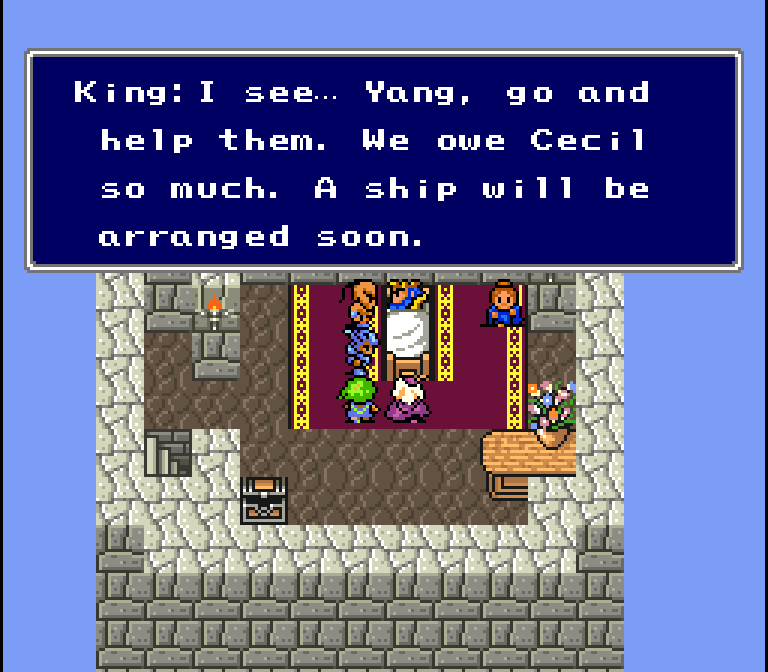 |
| Final Fantasy IV (Super Famicom) | Final Fantasy II (Super NES) |
The next morning, Cecil and gang are talking to the king:
| Japanese Version (basic translation) | English Translation |
| King of Fabul: …I see. I understand. | King: I see… |
| Yang. Accompany them and lend them your help. | Yang, go and help them. |
| We haven’t enough words to thank Sir Cecil. | We owe Cecil so much. |
| To think that even Rosa would be taken… | |
| I shall have a ship readied at once. | A ship will be arranged soon. |
| We hope it will help. | |
| Sir Cecil. Take this sword. It belonged to a Dark Knight who once came to Fabul long ago. | Cecil. Take this sword. Dark Knight who came to Fabul left this long ago. |
| It’s nothing. It’s the least I can do to thank you for fighting for Fabul. | |
| However, the way of the Dark Sword is one of darkness. It will surely have no effect against true evil. | But it is still the arms of the dark side… It will not work against the true evil. |
| You must defeat Golbeza for us. |
There are a few things of note in this short speech:
- In previous scenes, the English translation called him “King of Fabul” whenever he spoke. Here, he’s just called “King” now.
- In the Japanese text, the king is distressed by the fact that Rosa was kidnapped. This lets us see that he has a sympathetic side. In the English translation, he doesn’t mention her at all.
- The English text has been trimmed down quite a bit from the actual Japanese text, but it also adds in a line out of nowhere that says, “We hope it will help.”
- The king’s speech is full of more awkward non-native English which includes missing articles and the incorrect usage of articles.
- The king’s line about saying the sword is a simple token of gratitude is missing from the English translation. Maybe this was what “We hope it will help” was meant to be and it just got added to the wrong part of his speech?
- The final Japanese line in the king’s speech is missing entirely from the English translation.
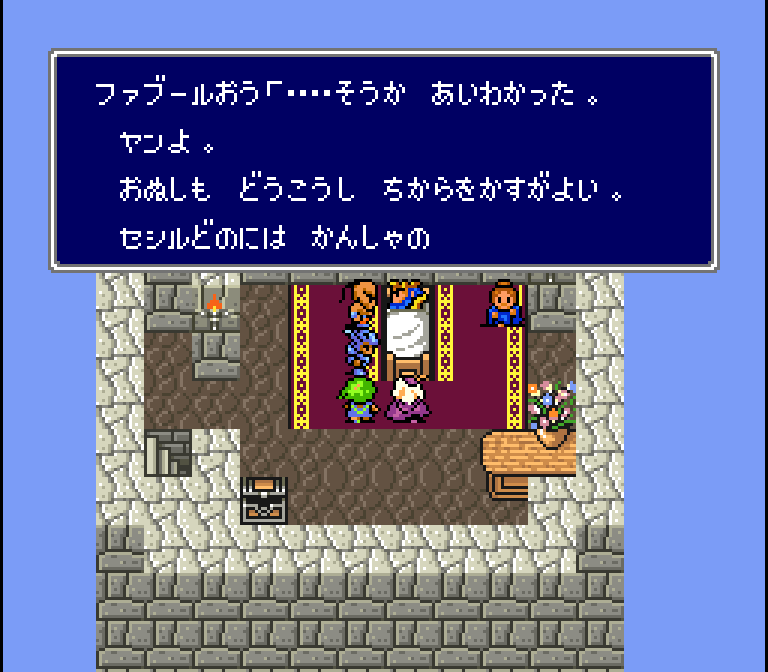 |  |
| Final Fantasy IV (Super Famicom) | Final Fantasy IV Easy Type (Super Famicom |
The king’s text was slightly simplified for Final Fantasy IV Easy Type.
In the original game, he says something like “accompany” while in the Easy Type version this was changed to be more like, “go with”.
I’ll Have One Death, Please
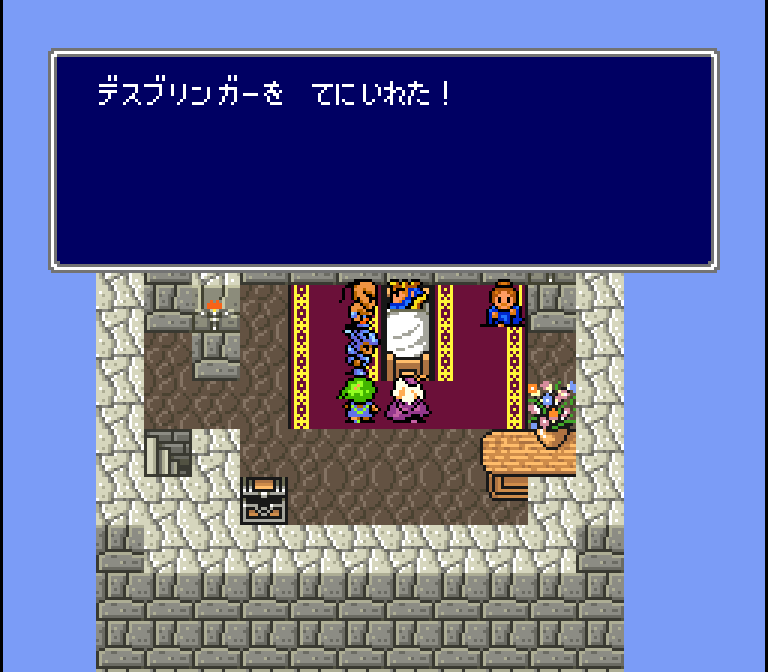 | 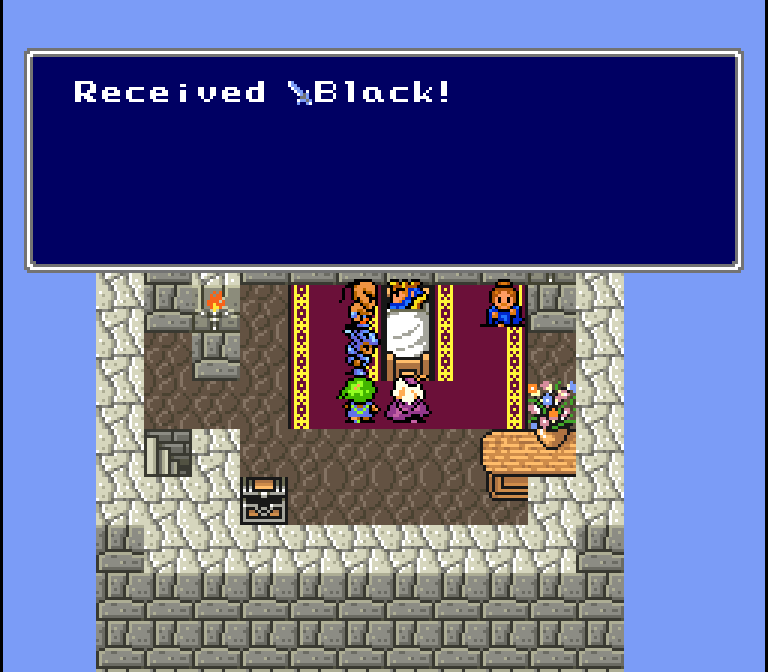 |
| Final Fantasy IV (Super Famicom) | Final Fantasy II (Super NES) |
After his speech, the king gives a sword to Cecil.
In English, this is called the “Black Sword”.
In Japanese, it’s called the “Death Bringer” or “Deathbringer”.
This sword is special – it often kills enemies in a single hit, even if they still have HP left. So that explains why it’s called the “Death Bringer” in Japanese.
I guess the localizers didn’t like the use of “death” in the item’s name. It’s strange, though, because the localizers forget to remove other instances of the word “death” in other parts of the game.
Polish is Good
 | 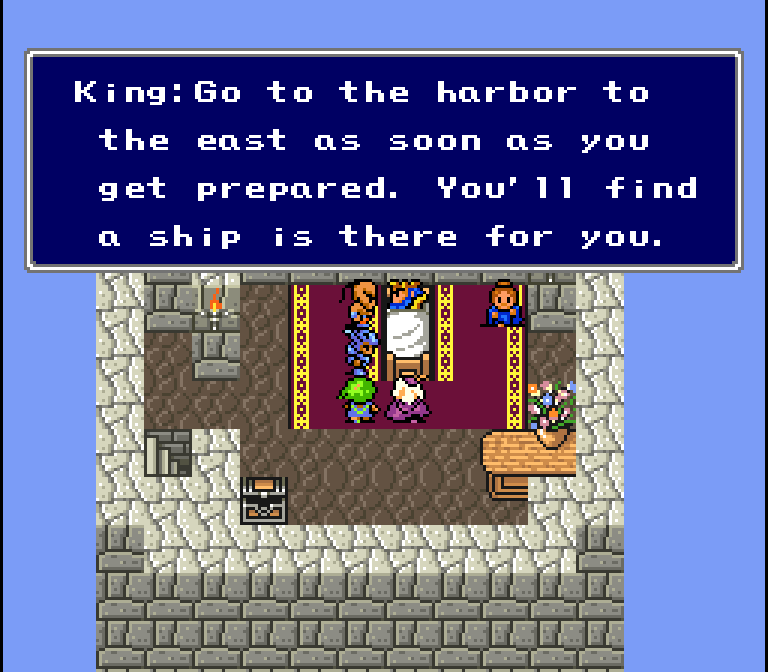 |
| Final Fantasy IV (Super Famicom) | Final Fantasy II (Super NES) |
There’s another line the king says. In English, it’s: “Go to the harbor to the east as soon as you get prepared. You’ll find a ship is there for you.”
My translator spidey senses say that a native speaker polished up this line. It sounds very natural and uses some phrasing that’s not often mastered by non-native English speakers. Given that it’s perfectly designed to fit in a single text box, my guess seems a little more likely too.
But it could just be complete coincidence and maybe I’m 100% wrong. But it struck me as very different from the rest of Fabul’s English text so far, enough that I thought it was worth mentioning.
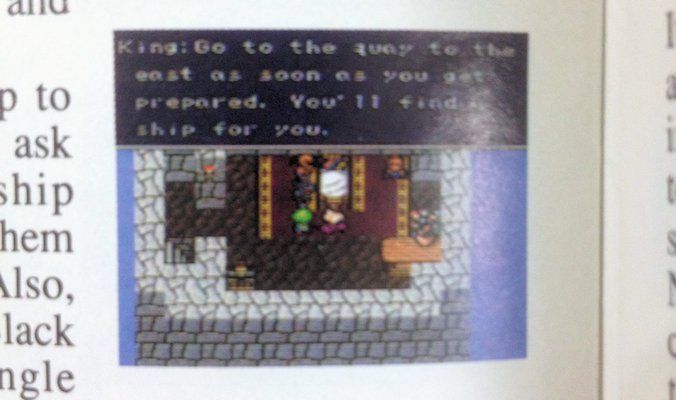
Almost a year after posting the above analysis, I got my hands on the Final Fantasy II manual again and found a screenshot of this line in it. Except the text in the screenshot says:
King: Go to the quay to the east as soon as you get prepared. You’ll find a ship for you.
Aha! So this line did get a good amount of revision work done on it after all. I guess the mention of a “quay” is what prompted it… I have no idea what that is, and I didn’t even think it was an actual English word until I checked just now. It means:
A structure built parallel to the bank of a waterway for use as a landing place.
I’m guessing it was just listed in a translation dictionary and the translator went with whatever looked shortest. Apparently the word dates back to the 1600s and is still in use today in Britain, but the Japanese translator wouldn’t have known that it’s a weird word that would be unfamiliar to most of the North American target audience.
The phrase, “You’ll find a ship for you.” also sounds a little odd, and it looks like whoever revised the text felt the same way.
Anyway, it’s really cool seeing glimpses of the original translation like this – I wish there were a way to see even more pieces of it somehow!
Lucky Times
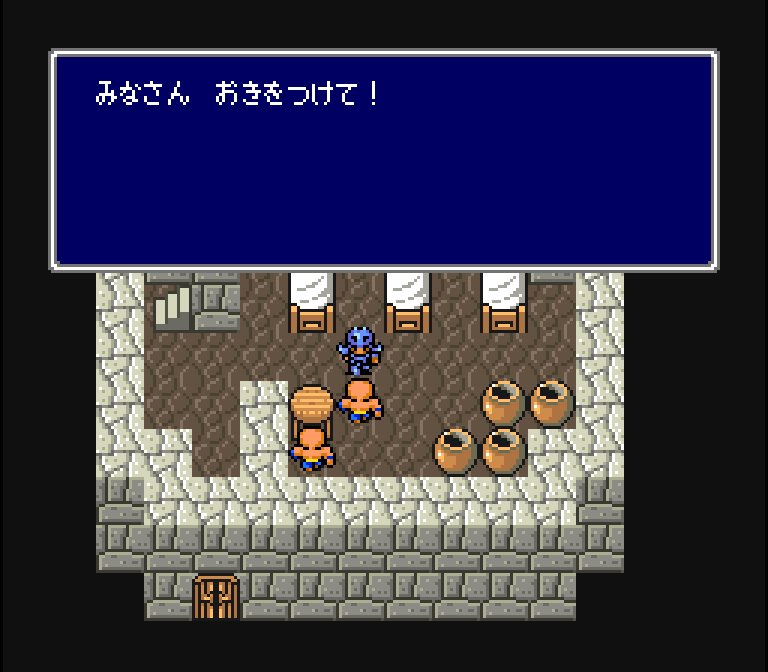 | 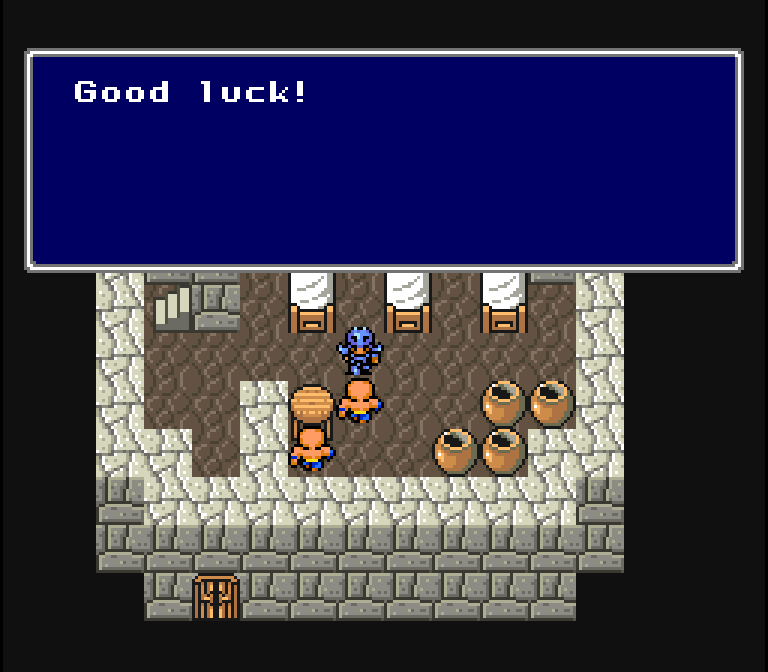 |
| Final Fantasy IV (Super Famicom) | Final Fantasy II (Super NES) |
These monks in the right tower now say in Japanese: “Take care, everyone!” or “Be careful, everyone!”
In the English translation, they say, “Good luck!”
Angry Gods
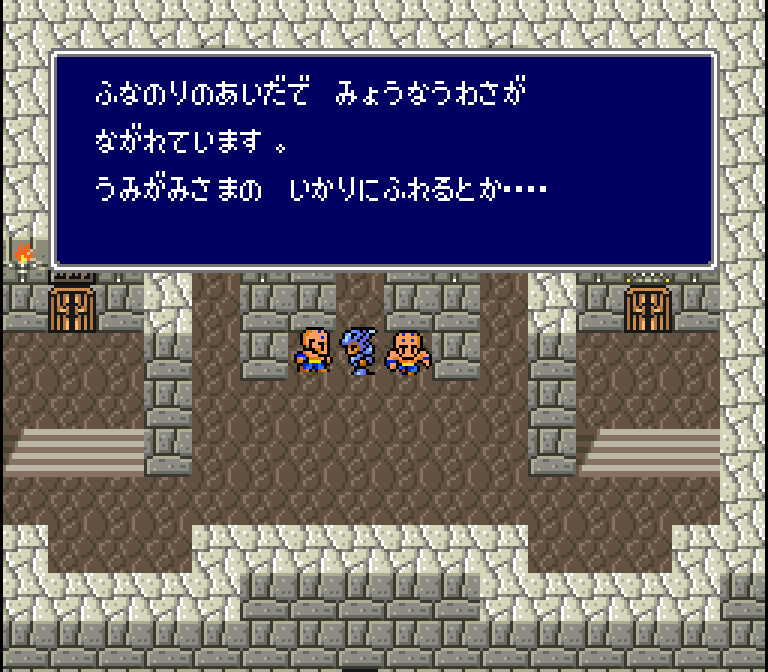 | 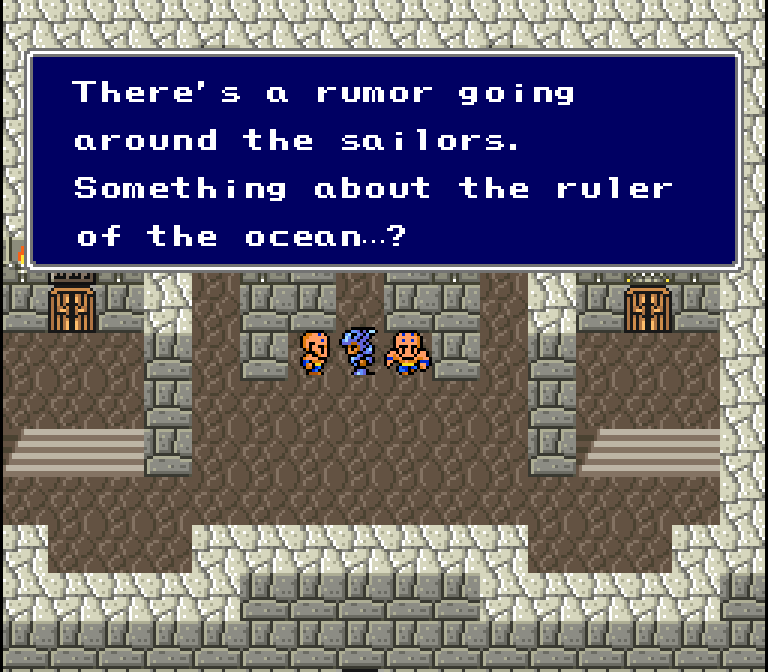 |
| Final Fantasy IV (Super Famicom) | Final Fantasy II (Super NES) |
These two monks in the castle now say this:
| Japanese Version (basic translation) | English Translation |
| There are strange rumors going around among the sailors. Something about incurring the wrath of the god of the sea… | There’s a rumor going around the sailors. Something about the ruler of the ocean…? |
First, the English text just says it’s a “rumor” rather than a “strange rumor”.
But the obvious difference here is that the English localization has written around the word “god” by saying “ruler” instead.
Stand Guard
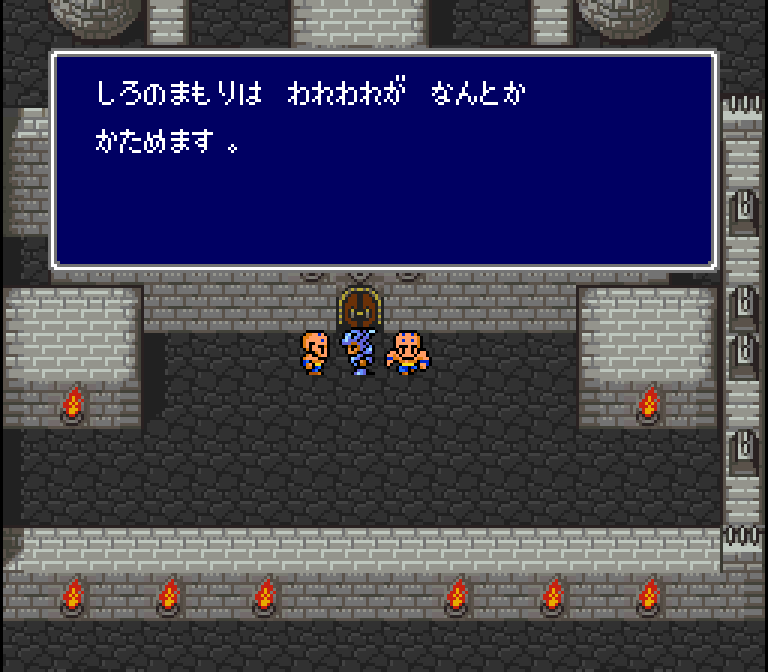 | 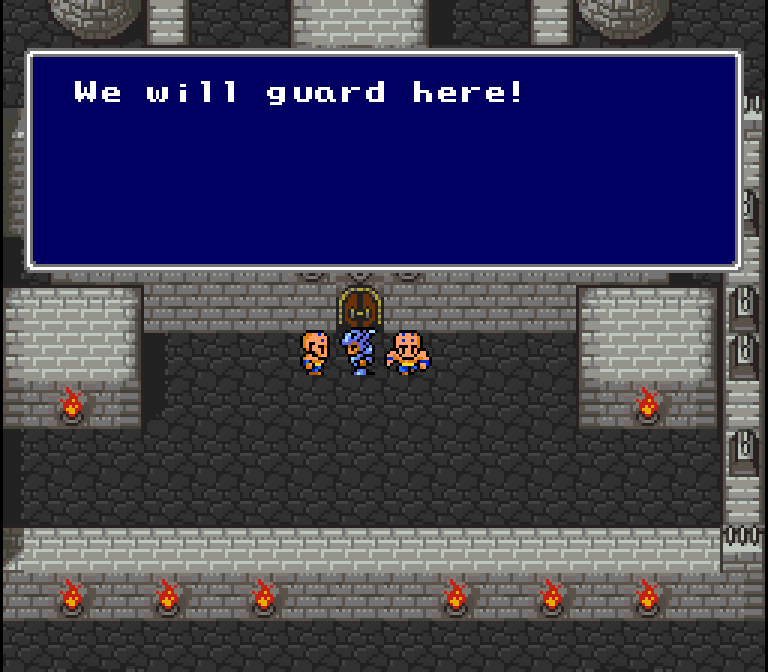 |
| Final Fantasy IV (Super Famicom) | Final Fantasy II (Super NES) |
These monks in the front area of the castle now say in English, “We will guard here!”
In Japanese, it’s more like, “We will somehow manage to tighten the castle’s defenses.”
Basically, it’s a little less of a forceful statement in Japanese. This makes sense, since Fabul’s main forces were wiped out on Mt. Hobs and many of their secondary forces were wiped out in the invasion itself.
The Bye Bye Wife
 | 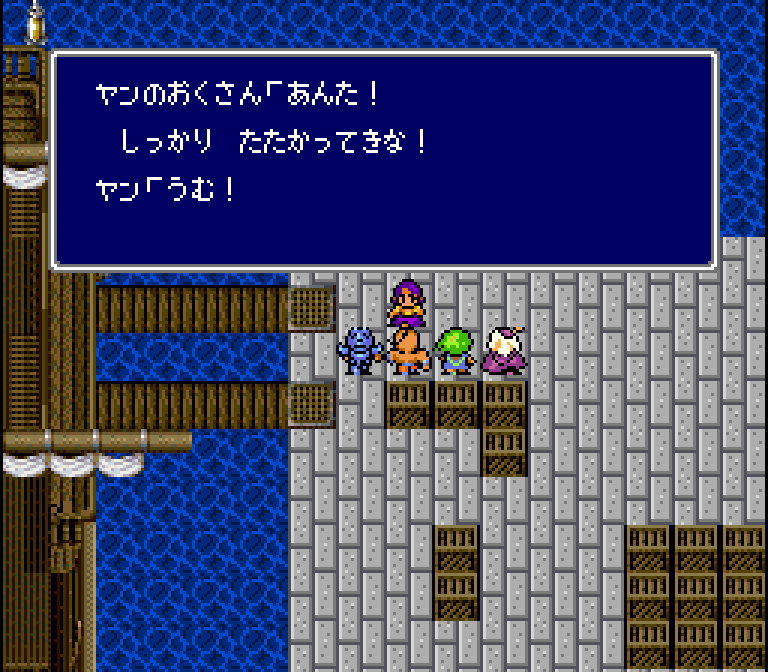 | 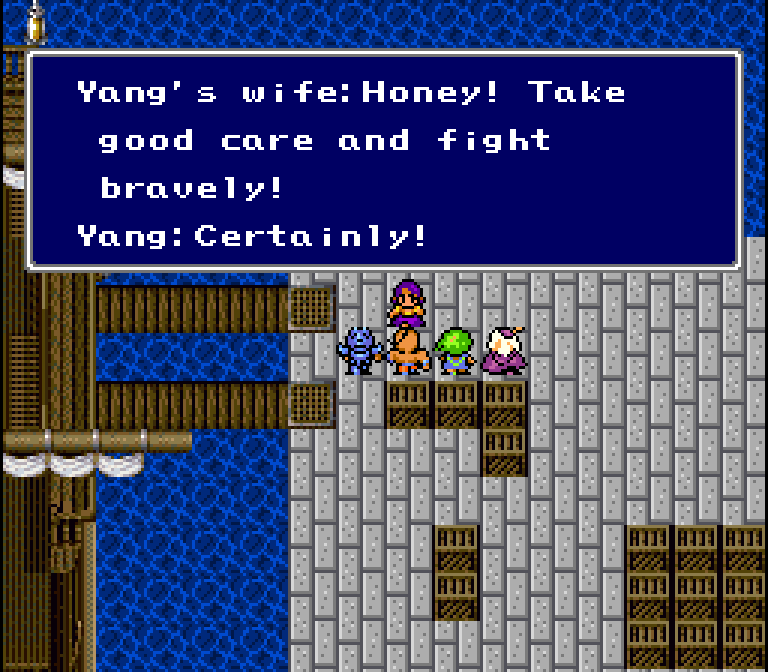 |
| Final Fantasy IV (Super Famicom) | Final Fantasy IV Easy Type (Super Famicom) | Final Fantasy II (Super NES) |
At the port, Yang’s wife sees Cecil and his friends off. Here’s how she starts the conversation:
| Japanese Version (basic translation) | English Translation |
| Honey! Take care and fight well! | Honey! Fight well! |
We see that Final Fantasy IV Easy Type changed her line and took out the “take care” part. This is possibly because the way she says it in Japanese is a little non-standard. She actually talks in a really neat, spirited way in Japanese, so it makes sense that she wouldn’t say that in a standard way.
From this we can see that her line in Final Fantasy II is based off of the original text and not Easy Type’s text.
Between this and many other things, I’m starting to think more and more that Final Fantasy IV Easy Type was based off of Final Fantasy II and not the other way around as people used to claim back in the day. But it’s hard to say for sure sometimes.
The Truth is Out There
 |  |
| Final Fantasy IV (Super Famicom) | Final Fantasy II (Super NES) |
The party sets sail for Baron, but along the way a giant whirlpool appears and a big monster comes out of it.
To this, one of the sailors on board says in English, “Is that true!”
I always felt that this was really weird English, plus it has bad punctuation.
It turns out that this line in Japanese is, “It really exists!?”
Levi…something
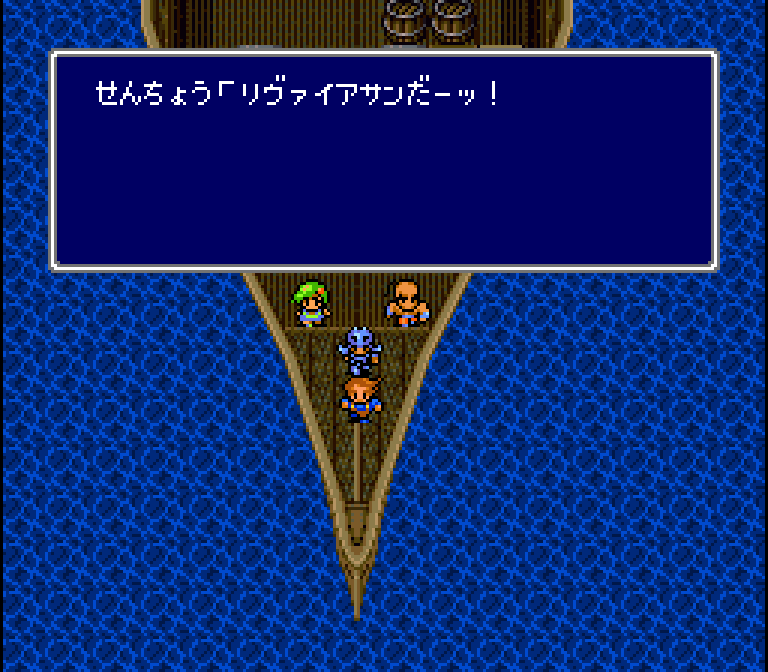 |  |
| Final Fantasy IV (Super Famicom) | Final Fantasy II (Super NES) |
The giant monster that comes out of the whirlpool is called “Leviatan” in English.
As you might expect, that isn’t quite what it’s called in Japanese. The Japanese version calls it “Leviathan”.
I’m assuming the English name had to be trimmed down because at one point you have to fight it as an enemy, and enemy names have name length restrictions.
Freak Dancing
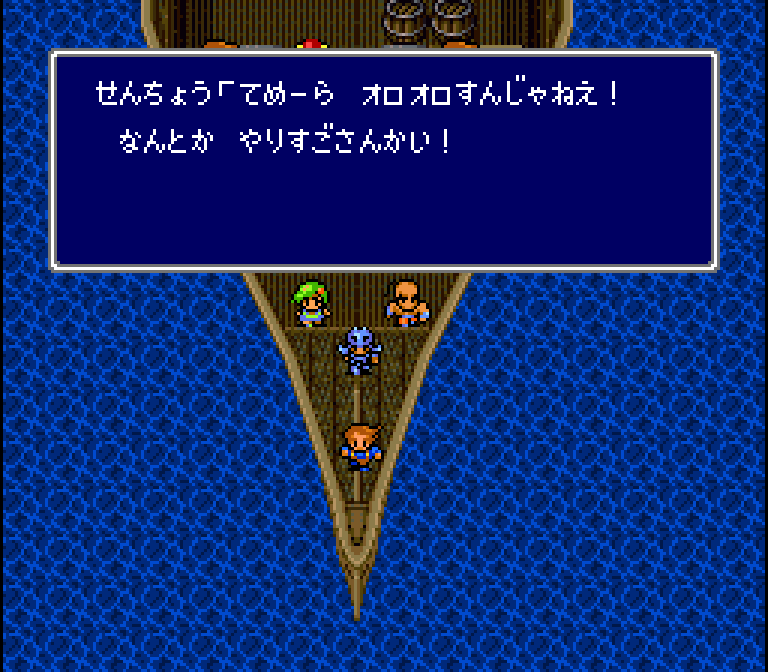 | 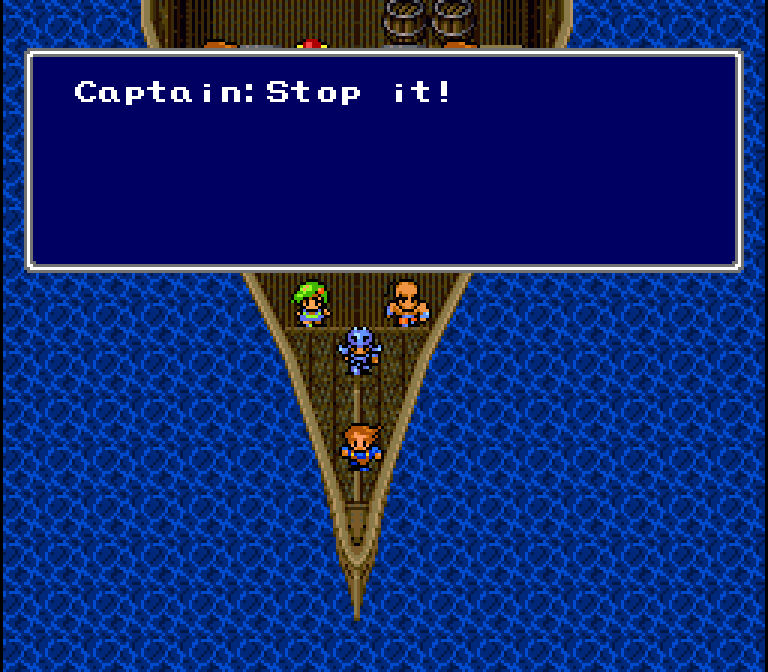 |
| Final Fantasy IV (Super Famicom) | Final Fantasy II (Super NES) |
As the ship starts to get drawn in by the whirlpool, all the sailors start spinning around madly and freaking out.
To this, the captain says in Japanese, “Quit freakin’ out, you lot! Ride it out somehow!”
But in English, he only says, “Stop it!”
While we’re here, I should mention that there’s another instance during this cut scene where Gilbert/Edward goes, “Uwaa!” in Japanese but goes, “No!” in English.
Attack of the Ums
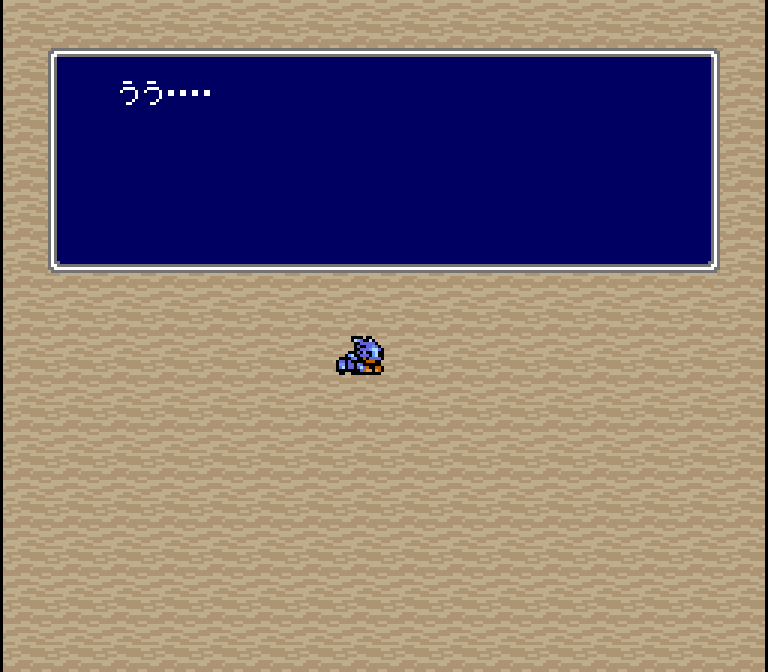 | 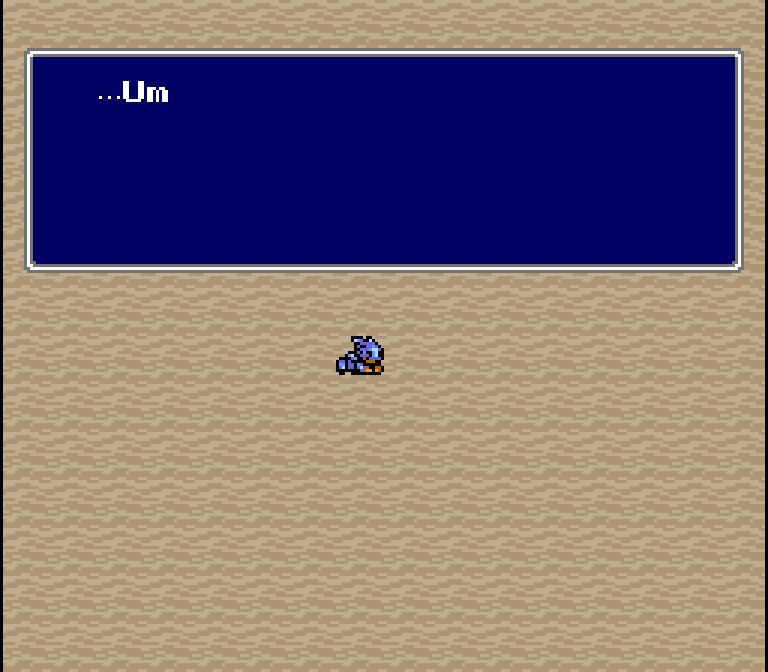 |
| Final Fantasy IV (Super Famicom) | Final Fantasy II (Super NES) |
The ship is destroyed and Cecil regains consciousness on a deserted beach.
In Japanese, he makes groaning sounds as he comes to and gets up.
In English, these become, “…Uh …Um”
It’s hard to do onomatopoeia in English – especially when Japanese does it so often – but this choice of “Uh” and “um” in English almost sounds like he’s trying to answer a question rather than grunting.
Personally, I’d have gone with at least something like, “Ugh…” or “Nngg…” but even then it’s hard to convey quite the same thing as the Japanese lines. Sometimes the simplest stuff is the toughest.


![press start to translate [Final Fantasy IV] press start to translate [Final Fantasy IV]](https://legendsoflocalization.com/wp-content/uploads/2019/08/bbenma.png)
“Keep in mind that the PlayStation translation was released in like 2001 or so, and the PSP version was released in 2011. So this simple localization choice has survived through three releases and at least a decade, if not more.”
I checked an LP of the Pixel Remaster, and it looks like we’re now up to four releases and at least two decades.